
Home > USC Columbia > College of Information and Communications > Journalism & Mass Communications > Journalism & Mass Communications Theses and Dissertations

Journalism & Mass Communications Theses and Dissertations
Theses/dissertations from 2023 2023.
The Impact of Follower-Influencer Relationship Stages on Consumers’ Perceptions and Behavioral Intentions in the Context of Influencer Marketing , Khalid Obaid Alharbi
The Effect of Social Media (Instagram) Use Patterns on The Cultural and Athletic Identity of Black Female Collegiate Athletes’ Body Image Dissatisfaction , Shelbretta Kar’Anna Ball
Contextualizing Search: An Analysis of the Impacts of Construal Level Theory, Mood, and Product Type on Search Engine Activity , Jackson Everitt Carter
Words Evaporate, the Images Remain: Testing Visual Warnings in the Context of Intentions to Vape Among U.S. Adults as an Expansion of the Theory of Planned Behavior (TPB) , Carl Arland Ciccarelli
Risk Propensity in Journalists: An Analysis of Journalists’ Personality Traits and How They Direct Behavior in the Field , Ellen Katherine Dunn
Online Information-Seeking and Cancer Screening Intention: An Analysis of the Health Information National Trends Survey 2022 , Rachel Aileen Ford
Always on Display: South Carolina Civil Rights Lawyer Matthew J. Perry Jr. Expanding the Civil Sphere Through the Courts and the News Media, 1954-1963 , Christopher G. Frear
Exploring the Agenda-Setting Dynamics Between Traditional Newspapers and Twitter During Mass Shooting Event , Yujin Heo
Extreme Persuasion: Analyzing Meaning Creation and Persuasive Strategies Within Extreme Discourse on Alternative Social Media , Naomi Kathryn Lawrence
Framing Police Brutality: An Analysis of Newspaper Coverage of Walter Scott’s Murder , Shamira S. McCray
Understanding Podcast Advertising Processing and Outcomes: An Analysis of Podcast Ad Types, Message Types, and Media Context on Consumer Responses , Colin Piacentine
The Unsung Heroes for Intercollegiate Athletics: Examining the Dialogic Principles of Communication in Community College Athletic Departments , Matthew Alan Stilwell
Exploring Trustworthiness Issues About Disaster-related Information Generated by Artificial Intelligence , Xin Tao
Theses/Dissertations from 2022 2022
The Effect of Emotional Intensity, Arousal, and Valence On Online Video Ad Sharing , Chang Won Choi
“Power, Poison, Pain & Joy”: Applying a Critical Race Conceptual Model of Implicit Racial Bias to Narratives Framing Blackness in Black Sports Columns, Black Music, and Black Journalism , Christina Lauren Myers
Gatekeeping Blackness: Roles, Relationships, and Pressures of Black Television Journalists at a Time of Racial Reckoning , Denetra Walker
The Binge Viewing Index: Creating and Testing a New Measure , Larry J. Webster Jr.
Theses/Dissertations from 2021 2021
Portion of Profit Donations: CSR as Public Relations Strategy and its Relationships with Trust and Purchase Intentions , Branden Dylan Cameron Birmingham
The Role of Sexting in the Development of Romantic Relationships , Max Bretscher
Let’s Be Friends: Examining Consumer Brand Relationships Through the Lens Of Brand Personality, Engagement, and Reciprocal Altruism , Daniel D. Haun
Go with The Flow: Testing the Effects of Emotional Flow on Psychophysiological, Attitudinal, and Behavioral Changes , Chris R. Noland
Brand New: How Visual Context Shapes Initial Response To Logos and Corporate Visual Identity Systems , Robert A. Wertz
Inoculating the Public Against Misinformation: Testing The Effectiveness of “Pre-bunking” Techniques in the Context of Mental Illness and Violence , Nanlan Zhang
Theses/Dissertations from 2020 2020
Gun Violence and Advocacy Communication , Minhee Choi
The Role of Third-person Perceptions in Predicting the Public’s Support for Electronic Cigarette Advertising Regulations , Joon Kyoung Kim
Conservative Media’s Coverage of Coronavirus on YouTube: A Qualitative Analysis of Media Effects on Consumers , Michael J. Layer
Theses/Dissertations from 2019 2019
Problem Chain Recognition Effect and CSR Communication: Examining the Impact of Issue Salience and Proximity on Environmental Communication Behaviors , Nandini Bhalla
The Games Behind the Scenes: Newspaper Framing of Female African American Olympic Athletes , Martin Reece Funderburk
Effectiveness of a Brand’s Paid, Owned, and Earned Media in a Social Media Environment , Anan Wan
Providing Prevention Education About Child Sexual Abuse to Parents: Testing Media Effects on Knowledge, Behavioral Intentions and Outcomes , Jane Long Weatherred
Theses/Dissertations from 2018 2018
Creating an Online Social Movement in Socially Conservative Societies: A Case Study of Manshoor Blog Using Frame Alignment Process , Noura Abdullah Al-Duaijani
How S. C. Daily Newspapers Framed the Removal of the Confederate Flag from the State House Grounds in 2015 Through Letters to the Editor and Editorials , Thomas Craig Anderson
Breaking The Silence: Extending Theory To Address The Underutilization Of Mental Health Services Among Chinese Immigrants In The United States , Jo-Yun Queenie Li
Fandom In Politics: Scale Development And Validation , Won-Ki Moon
Fatal Force: A Conversation With Journalists Who Cover Deadly, Highly-Publicized Police Shootings , Denetra Walker
Domestic Extension Of Public Diplomacy: Media Competition For Credibility, Dependency And Activation Of Publics , Yicheng Zhu
Theses/Dissertations from 2017 2017
Hydraulic Fracturing In the United States: A Framing Analysis , Kenneth Stephen Cardell Jr.
Network vs. Netflix: A Comparative Content Analysis of Demographics Across Prime-Time Television and Netflix Original Programming , James Corfield
Framing Marijuana: A Study of How us Newspapers Frame Marijuana Legalization Stories and Framing Effects of Marijuana Stories , Hwalbin Kim
The Allure of Isis: Examining the Underlying Mechanisms that Helped the Islamic State in Iraq and Syria , Alexander Luchsinger
International Twitter Comments About 2016 U.S. Presidential Candidates Trump And Clinton: Agenda-Building Analysis In The U.S., U.K., Brazil, Russia, India and China , Jane O’Boyle
Is That Online Review Fake News? How Sponsorship Disclosure Influences Reader Credibility , Mark W. Tatge
Theses/Dissertations from 2016 2016
Measuring Strategic Communications , Jeffrey A. Ranta
Public Perceptions Of Genetically Modified Food On Social Media: A Content Analysis Of Youtube Comments On Videos , Nanlan Zhang
Toward A Situational Technology Acceptance Model: Combining the Situational Theory of Problem Solving and Technology Acceptance Model to Promote Mobile Donations for Nonprofit Organizations , Yue Zheng
Theses/Dissertations from 2015 2015
Promoting HPV Vaccination for Male Young Adults: Effects of Social Influence , Wan Chi Leung
Redneckaissance: Honey Boo Boo, Tumblr, and the Stereotype of Poor White Trash , Ashley F. Miller
Theses/Dissertations from 2014 2014
Conflicted Union: Culture, Economics and European Union Media Policy , Daphney Pernola Barr
Beating Down the Fear: The Civil Sphere and Political Change in South Carolina, 1940-1962 , Sid Bedingfield
The State v. Perry: Comparative Newspaper Coverage of South Carolina's Most Prominent Civil Rights Lawyer , Christopher G. Frear
(MASCOT) NATION: EXAMINING UNIVERSITY ENGAGEMENT ON COLLEGE FOOTBALL TEAMS’ FACEBOOK PAGES , Matthew J. Haught
Innovation Among Georgian Journalism Educators: A Network Analysis Perspective , Ana Keshelashvili
Emotional Bond between the Creator and the Avatar: Changes in Behavioral Intentions to Engage in Alcohol-Related Traffic Risk Behaviors , Hokyung Kim
Handcuffing Speech: Federal Fraud Statutes and the Criminalization of Advertising , Carmen Maye
Social Movements, Media, and Democratization in Georgia , Maia Mikashavidze
Am I in Danger? : Predictors and Behavioral Outcomes of Public Perception of Risk Associated with Food Hazards , Sang-Hwa Oh
Parental Mediation of Adolescent Movie Viewing , Larry James Webster Jr.
Theses/Dissertations from 2013 2013
Political Advertising In Kuwait - A Functional Discourse Analysis , Jasem Alqaseer
The Westernization of Advertisements Published In Kuwaiti Newspapers From 1992 to 2012; A Content Analysis , Farah Taleb Alrefai
What Can Reader Comments to News Online Contribute to Engagement and Interactivity? A Quantitative Approach , Brett A. Borton
Exploring a paradigm shift: The New York Times' framing of sub-Saharan Africa in stories of conflict, war and development during the Cold War and post-Cold War eras, 1945-2009 , Zadok Opero Ekimwere
Mental Health On Youtube: Exploring the Potential of Interactive Media to Change Knowledge, Attitudes and Behaviors About Mental Health , Caroline Belser Foster
That's News to Me: An Exploratory Study of the Uses and Gratifications of Current Events On Social Media of 18-24 Year-Olds , John Vincent Karlis
Making Stewardship Meaningful For Nonprofits: Stakeholder Motivations, Attitudes, Loyalty and Behaviors , Geah N. Pressgrove
An Alternative Path: The Intellectual Legacy of James W. Carey , Matthew Ross
The Corporation in the Marketplace of Ideas: The Law and Economics of Corporate Political Speech , Matthew W. Telleen
Child Sexual Abuse In the Media: Is Institutional Failure to Blame? , Jane Long Weatherred
Theses/Dissertations from 2012 2012
The Relationship Between Facebook Use and Religiosity Among Emerging Adults , Heidi D. Campbell
Attribute Agenda Setting, Attribtue Priming, and The Public's Evaluation of Genetically Modified (GM) Food in South Korea , Soo Yun Kim
What's Mine is Yours: An Exploratory Study of Attitudes and Conceptions About Online Personal Privacy In the Socialist Republic of Vietnam , Patrick Sharbaugh
Theses/Dissertations from 2011 2011
How Journalists Perceive Internal and External Influence: A Qualitative Assessment of Local Television Reporters' Ethical Decision-Making , Beth Eckard Concepcion
Collective Memory of the War In Iraq: An Analysis of Letters to the Editor and Public Opinion Polls, 2003-2008 , Lisa Cash Luedeman
A Framing Analysis and Model of Barack Obama in Political Cartoons , Anthony Palmer
Theses/Dissertations from 2010 2010
Breaking Down the Fear' -- John H. Mccray, Accommodationism and theFraming of the Civil Rights Struggle in South Carolina, 1940-1948 , Sid Bedingfield
Do You See What I See?: A Comparative Content Analysis of Iraq War Photographs As Published In the New York Times and the Tehran Times , Garen Cansler
Exploring Intention to Adopt Mobile Tv Services In the U.S.: Toward A New Model With Cognitive-Based and Emotional-Based Constructs , Seoyoon Choi
Media Representations and Implications For Collective Memory: A Grounded Theory Analysis of TV News Broadcasts of Hillary Clinton From 1993-2008 , Mary Elizabeth McLaughlin
Resonance and Elaboration: the Framing Effect of Chinese Product Safety Issue Coverage , Ji Pan
Advanced Search
- Notify me via email or RSS
- Collections
- Disciplines
Submissions
- Give us Feedback
- University Libraries
Home | About | FAQ | My Account | Accessibility Statement
Privacy Copyright
Home > FACULTIES > Information & Media Studies (FIMS) > MEDIASTUDIES-ETD

Media Studies Theses and Dissertations
This collection contains theses and dissertations from the Department of Media Studies, collected from the Scholarship@Western Electronic Thesis and Dissertation Repository
Theses/Dissertations from 2023 2023
Witnessing Conspiracy Theories: Developing an Intersectional Approach to Conspiracy Theory Research , David Guignion
Canadians Redefining R&B: The Online Marketing of Drake, Justin Bieber, and Jessie Reyez , Amara Pope Ms.
Theses/Dissertations from 2022 2022
Instagram Influencers and their Youngest Female Followers , Amanda Jenkins
A descriptive analysis of sport nationalism, digital media, and fandom to launch the Canadian Premier League , Farzan Mirzazadeh
Influencer Engagement Pods and the Struggle Over Measure in Instagram Platform Labour , Victoria J. O'Meara
Radiant Dreams and Nuclear Nightmares: Japanese Resistance Narratives and American Intervention in Postwar Speculative Popular Culture , Aidan J. Warlow
Theses/Dissertations from 2021 2021
More barriers than solutions: Women’s experiences of support with online abuse , Chandell E. Gosse
Heavy Metal Fundraisers: Entrepreneurial Recording Artists in Platform Capitalism , Jason Netherton
Theses/Dissertations from 2019 2019
Resistant Vulnerability in The Marvel Cinematic Universe's Captain America , Kristen Allison
Unwrapping the Toronto Christmas Market: An Examination of Tradition and Nostalgia in a Socially Constructed Space , Lydia J. Gibson
Trauma, Creativity, And Bearing Witness Through Art: Marian Kołodziej's Labyrinth , Alyssa Logie
Appropriating Play: Examining Twitch.tv as a Commercial Platform , Charlotte Panneton
Dead Men Walking: An Analysis of Working-Class Masculinity in Post-2008 Hollywood Film , Ryan Schroeder
Glocalization in China: An Analysis of Coca-Cola’s Brand Co-Creation Process with Consumers in China , Yinuo Shi
Critiquing the New Autonomy of Immaterial Labour: An Analysis of Work in the Artificial Intelligence Industry , James Steinhoff
Watching and Working Through: Navigating Non-being in Television Storytelling , Tiara Lalita Sukhan
Theses/Dissertations from 2018 2018
Hone the Means of Production: Craft Antagonism and Domination in the Journalistic Labour Process of Freelance Writers , Robert Bertuzzi
Invisible Labour: Support-Service Workers in India’s Information Technology Industry , Indranil Chakraborty
Exhibiting Human Rights: Making the Means of Dignity Visible , Amy J. Freier
Industrial Stagecraft: Tooling and Cultural Production , Jennifer A. Hambleton
Cultural Hybridity in the Contemporary Korean Popular Culture through the Practice of Genre Transformation , Kyunghee Kim
Theses/Dissertations from 2017 2017
Regarding Aid: The photographic situation of humanitarianism , Sonya de Laat
The Representation of the Canadian Government’s Warrantless Domestic Collection of Metadata in the Canadian Print News Media , Alan Del Pino
(Not) One of the Boys: A Case Study of Female Detectives on HBO , Darcy Griffin
Pitching the Feminist Voice: A Critique of Contemporary Consumer Feminism , Kate Hoad-Reddick
Local-Global Tensions: Professional Experience, Role Perceptions and Image Production of Afghan Photojournalists Working for a Global Audience , Saumava Mitra
A place for locative media: A theoretical framework for assessing locative media use in urban environments , Darryl A. Pieber
Mapping the Arab Diaspora: Examining Placelessness and Memory in Arab Art , Shahad Rashid
Settler Colonial Ways of Seeing: Documentary Governance of Indigenous Life in Canada and its Disruption , Danielle Taschereau Mamers
Theses/Dissertations from 2016 2016
Finding Your Way: Navigating Online News and Opinions , Charlotte Britten
Law and Abuse: Representations of Intimate Partner Homicide in Law Procedural Dramas , Jaime A. Campbell
Creative Management: Disciplining the Neoliberal Worker , Trent Cruz
No hay Sólo un Idioma, No hay Sólo una Voz: A Revisionist History of Chicana/os and Latina/os in Punk , Richard C. Davila
Shifting Temporalities: The Construction of Flexible Subjectivities through Part-time Retail Workers’ Use of Smartphone Technology , Jessica Fanning
Becoming Sonic: Ambient Poetics and the Ecology of Listening in Four Militant Sound Investigations , David C. Jackson
Capital's Media: The Physical Conditions of Circulation , Atle Mikkola Kjøsen
On the Internet by Means of Popular Music: The Cases of Grimes and Childish Gambino , Kristopher R. K. Ohlendorf
Believing the News: Exploring How Young Canadians Make Decisions About Their News Consumption , Jessica Thom
Theses/Dissertations from 2015 2015
Narrative Epic and New Media: The Totalizing Spaces of Postmodernity in The Wire, Batman, and The Legend of Zelda , Luke Arnott
Canada: Multiculturalism, Religion, and Accommodation , Brittainy R. Bonnis
Navigating the Social Landscape: An Exploration of Social Networking Site Usage among Emerging Adults , Kristen Colbeck
Impassioned Objects And Seething Absences: The Olympics In Canada, National Identity and Consumer Culture , Estee Fresco
Satirical News and Political Subversiveness: A Critical Approach to The Daily Show and The Colbert Report , Roberto Leclerc
"When [S]He is Working [S]He is Not at Home": Challenging Assumptions About Remote Work , Eric Lohman
Heating Up the Debate: E-cigarettes and Instagram , Stephanie L. Ritter
Limitation to Innovation in the North American Console Video Game Industry 2001-2013: A Critical Analysis , Michael Schmalz
Happiest People Alive: An Analysis of Class and Gender in the Trinidad Carnival , Asha L. St. Bernard
Human-Machinic Assemblages: Technologies, Bodies, and the Recuperation of Social Reproduction in the Crisis Era , Elise D. Thorburn
Theses/Dissertations from 2014 2014
Evangelizing the ‘Gallery of the Future’: a Critical Analysis of the Google Art Project Narrative and its Political, Cultural and Technological Stakes , Alanna Bayer
Face Value: Beyond the Surface of Brand Philanthropy and the Cultural Production of the M.A.C AIDS Fund , Andrea Benoit
Cultivating Better Brains: Transhumanism and its Critics on the Ethics of Enhancement Via Brain-computer Interfacing , Matthew Devlin
Man Versus Food: An Analysis of 'Dude Food' Television and Public Health , Amy R. Eisner-Levine
Media Literacy and the English as a Second Language Curriculum: A Curricular Critique and Dreams for the Future , Clara R. Madrenas
Fantasizing Disability: Representation of loss and limitation in Popular Television and Film , Jeffrey M. Preston
(Un)Covering Suicide: The Changing Ethical Norms in Canadian Journalism , Gemma Richardson
Labours Of Love: Affect, Fan Labour, And The Monetization Of Fandom , Jennifer Spence
'What's in a List?' Cultural Techniques, Logistics, Poeisis , Liam Cole Young
Theses/Dissertations from 2013 2013
Distinguishing the 'Vanguard' from the 'Insipid': Exploring the Valorization of Mainstream Popular Music in Online Indie Music Criticism , Charles J. Blazevic
Anonymous: Polemics and Non-identity , Samuel Chiang
Manufacturing Legitimacy: A Critical Theory of Election News Coverage , Gabriel N. Elias
The Academic Grind: A Critique of Creative and Collaborative Discourses Between Digital Games Industries and Post-Secondary Education in Canada , Owen R. Livermore
We’re on This Road Together: The Changing Fan/Producer Relationship in Television as Demonstrated by Supernatural , Lisa Macklem
Brave New Wireless World: Mapping the Rise of Ubiquitous Connectivity from Myth to Market , Vincent R. Manzerolle
Promotional Ubiquitous Musics: New Identities and Emerging Markets in the Digitalizing Music Industry , Leslie Meier
Money, Morals, and Human Rights: Commercial Influences in the Marketing, Branding, and Fundraising of Amnesty International and Human Rights Watch , Danielle Morgan
If I Had a Hammer: An Archeology of Tactical Media From the Hootenanny to the People's Microphone , Henry Adam Svec
Theses/Dissertations from 2012 2012
Watching High School: Representing Disempowerment on Teen Drama Television , Sarah M. Baxter
Will Work For Free: Examining the Biopolitics of Unwaged Immaterial Labour , Brian A. Brown
Social Net-working: Exploring the Political Economy of the Online Social Network Industry , Craig Butosi
Watching the games: Critical media literacy and students’ abilities to identify and critique the politics of sports , Raúl J. Feliciano Ortiz
The Invisible Genocide: An Analysis of ABC, CBS, and NBC Television News Coverage of the 1994 Genocide in Rwanda. , Daniel C. Harvey
It's Complicated: Romantic Breakups and Their Aftermath on Facebook , Veronika A. Lukacs
Keeping Up with the Virtual Joneses: The Practices, Meanings, and Consequences of Consumption in Second Life , Jennifer M. Martin
The (m)Health Connection: An Examination of the Promise of Mobile Phones for HIV/AIDS Intervention in Sub-Saharan Africa , Trisha M. Phippard
Born Again Hard : Transgender Subjectivity in Paul Chadwick's Concrete , Justin Raymond
Communicating Crimes: Covering Gangs in Contemporary Canadian Journalism , Chris Richardson
Online Social Breast-Working: Representations of Breast Milk Sharing in the 21st Century , Cari L. Rotstein
Because I am Not Here, Selected Second Life-Based Art Case Studies. Subjectivity, Autoempathy and Virtual World Aesthetics , Francisco Gerardo Toledo Ramírez
Day of the Woman?: Feminism & Rape-Revenge Films , Kayley A. Viteo
Theses/Dissertations from 2011 2011
"Aren't They Keen?" Early Children's Food Advertising and the Emergence of the Brand-loyal Child Consumer , Kyle R. Asquith
Immediacy and Aesthetic Remediation in Television and Digital Media: Mass Media’s Challenge to the Democratization of Media Production , Michael S. Daubs
- Accessible Formats
Advanced Search
- Notify me via email or RSS
- Expert Gallery
- Online Journals
- eBook Collections
- Reports and Working Papers
- Conferences and Symposiums
- Electronic Theses and Dissertations
- Digitized Special Collections
- All Collections
- Disciplines
Author Corner
- Submit Thesis/Dissertation
Home | About | FAQ | My Account | Accessibility Statement | Privacy | Copyright
©1878 - 2016 Western University

- USF Research
- USF Libraries
Digital Commons @ USF > College of Arts and Sciences > Mass Communications > Theses and Dissertations
Mass Communications Theses and Dissertations
Theses/dissertations from 2023 2023.
An Experimental Analysis of the Effect of Crisis Response Message Strategies on Consumer Emotions, Perceptual Beliefs and Intended Behavior , Valentina Ahumada
How the Taiwanese podcast Bailingguo News framed the 2019 Hong Kong movement: A framing analysis of the anti-Extradition Law Amendment Bill , Yu-Fei Chiu
Advocating for Diversity, Equity, and Inclusion: A Study of the NHL’s #HockeyIsForEveryone Campaign on Twitter , Jessica Martinez
Theses/Dissertations from 2022 2022
An Analysis of International Soccer Fans’ Knowledge of Qatar, Perceptions of Qatar’s Country Image, and Intention to Support the 2022 FIFA World Cup , Taleb Al-Adbah
Analysis of Prescription Drug Brand Mentions in Music: Prevalence and Consumer Perceptions , Lisa A. Blake
Elements of Instagram Influencer Posts that Drive Follower Engagement , Yishan Li
Communicating Breast Cancer Awareness: Using the Health Belief Model to Develop Mass Communication Themes to Influence Early Detection Behaviors , Srisai Kamakshi Ramya Harika Pucha
The European Super League (ESL): A Political Economy and Media Framing Analysis , Patrick Sidwell
Inaugural Addresses, Framing Theory, and the Impact on American Perceptions of the Presidency , Kalin Meagan Velez
The Use of Social Media by Leaders in Times of Crisis: 2020–21 United States Election Protests , Cagdas Yuksel
Theses/Dissertations from 2021 2021
The Influence of Hate Speech on TikTok on Chinese College Students , Tengyue Chen
Cultivating Courage: Medical Dramas and Portrayals of Patient Self-Advocacy , Alyssa H. Harrell
The Media Reproduction of Racial Violence: A Content Analysis of News Coverage Following the Death of George Floyd Jr. , Keylon Lovett
Credibility of Spokespersons and E-cigarette Prevention Messages: Elaboration Likelihood Model and The Moderating Role of Perceived Risk , Emmanuel Maduneme
An Examination of COVID-19 Health Behaviors and Public Health Messaging Using the Health Belief Model and Organization-Public Relationship Quality , Aaron L. Nichols
The Extended Parallel Processing Model (EPPM) and Risk Perceptions of Twitter messages related to COVID-19 , Muhammad E. Rasul
Framing #MeToo movement in China A Content Analysis of China Women’s News Coverage , Wenminzi Wu
Theses/Dissertations from 2020 2020
Super Bowl Ads and the Donald Trump Culture War , Jessica Barron
A Case Study on Black Twitter’s Reactions to the Framing of Blacks in Dove’s 2017 Facebook Advertisement , Shereena Farrington
The Roles of Emotional Cues and Purchasing Incentives in WeChat Commerce: A Content Analysis , Xuezhu Hao
People with Parkinson’s and Care Partners of PwPs’ Uncertainty Management Through Information Strategies , Amy Haywood
Asian Male Stereotypes: An Investigation of Current Beliefs About Asian Males and Stereotypes Perpetuated by U.S. Modern Cinema , Noelle Knopp
Developing Design Elements for a Parkinson’s Disease Informative Website: A Social Marketing Approach , Emilie R. Madsen
Evaluation of Native Advertisement though Third Person Effect Theory: An Experimental Design , Inga Nafetvaridze
EPPM and Its Effectiveness in Advertisements of Colorectal Cancer Screening among Young Adults , Anh T. Nguyen
The Role of Threat and Efficacy in Anti-Vaping Ads: A Test of the Extended Parallel Process Model , Ryan Noone
An Experimental Investigation into the Impact of Crisis Response Strategies and Relationship Management in the Pharmaceutical Industry , Nikoletta Pappas
Media Fandom: Social Media Use and Collective Identity in China: A Case Study of Z.Tao’s Weibo Fandom , Mier Sha
'Golden Spike': Examining Atlanta United FC Communications During the Launch of the Team , Maria Tsyruleva
The Role of Influencer Endorsement in Consumer Brand Engagement on Sina Weibo , Xiaofan Wei
One News Event, Three Media Frames , Le Xin
Applying the Situational Theory of Publics to Children's Sex Education in China , Baoyi Zeng
Theses/Dissertations from 2019 2019
The Role of Social Media Journalists in TV News:Their Effects on the Profession and Identity of TV Journalism, the Quality of News, and theAudience Engagement , Yousuf Humiad AL Yousufi
Relationship Management Communications by NHL Teams on Twitter , Kelsey M. Baker
2018 China-United States Trade War: Framing Analysis of Online News Coverage in the United States and China as portrayed by the New York Times and the People’s Daily , Jiangling Huang
The Research on the Determinants of Users' Willingness to Pay for Chinese Paid Sports Model Based on Use and Gratification Theory , Jing Li
Online MMORPG Games in China: Player Motivations and the Mediating Role of Flow , Jiaxin Liu
The Hostile Media Effect and Its Potential Consequences: Examining the Influence of Presumed Influence of International Media Coverage , Zhennan Liu
Womenpreneurs in a Digital Environment: Utilizing Instagram to Build a Personal Brand , Michelle N. Nuñez
Objectification of Women in Bollywood Item Numbers , Zahabia Z. Slatewala
A Research on eSports Users’ Motives and Satisfaction in China The Case of League of Legends , Qianyin Sun
An Analysis of the Language and the Relationship of the President of the USA Related Twitter Accounts toward the National Media , Sait Serif Turhan
Theses/Dissertations from 2018 2018
Perception of Kazakhstan in the U.S through the New York Times Coverage , Tursynay Alikhanova
The Influence of Instagram Selfies on Female Millennials’ Appearance Satisfaction , Diliara Bagautdinova
Women’s Body Image in the Media: Fitspiration on Instagram , Brook M. Bryant
Political Talk Shows in Taiwan: First- and Third-Person Effects, Their Attitudinal Antecedents and Consequences , Shou-Chen Hsieh
An Examination of Image Repair Theory and BP’s Response to the Deepwater Horizon Oil Spill , William Anthony Korte Jr.
An Analysis of Organ Donation Presentations on Weibo , Shengfei Li
Gender Sexualization in Digital Games: Exploring Female Character Changes in Tomb Raider , Jingjing Liu
Shithole Countries: An Analysis of News Coverage in the U.S. , Murewa O. Olubela
Self-esteem, motivation, and self-enhancement presentation on WeChat , Xiao Qiu
The Portrayal of Women in the Oldest Russian Women’s Magazine “Rabotnitsa” From 1970-2017 , Anastasiia Utiuzh
Cultural Adaptation and Maintenance: Chinese International Students' Use of Facebook and WeChat , Mengni Wang
The Understanding of Absolute Right to Freedom of Expression in the Case of Hate Speech , Qinqin Wang
Body Image, Self-Esteem and Eating Disturbance among Chinese Women: Testing the Tripartite Influence model , Weiwei Wang
I’m Your Fan – Engaging in Celebrity’s Social Media Page with the Mediation of Parasocial Interaction and Parasocial Relationship , Jiahui Zhuang
Theses/Dissertations from 2017 2017
Household Food Waste Prevention in Malaysia: An Issue Processes Model Perspective , Syahirah Abd Razak
Countering the Questionable Actions of the CPD and FEC , Brian C. Cole
“You Know Who I Am, Don’t You? I’m the One They’re Writing About in the Newspapers and on TV” , Casey Killen Crane
To Tell the Truth: The Credibility of Cable News Networks In an Era of Increasingly Partisan Political News Coverage , Christopher Jadick
Political Media Bias in the United States: Immigration and the Trump Administration , Bryce Josepher
Social Media Use and Political Participation in China: The Mediating Role of Political Efficacy , Bingyang Liu
Framing Genetically-modified Foods Communication in China: A Content Analysis of News Coverage of People’s Daily and Southern Metropolis , Linqi Lu
Conceptualizing Social Wealth in the Digital Age: A Mixed Methods Approach , Kristina Oliva
The Road to the White House: A Correlational Analysis of Twitter Sentiment and National Polls in the 2016 Election Cycle , Melissa G. Pelletier
Using Green Messages to Cue Recycling Tendencies , Danielle Quichocho
Traversing Privacy Issues on Social Networking Sites Among Kuwaiti Females , Shahad Shihab
Chinese National Identity and Media Framing , Yufeng Tian
Smog Pollution in China: News Framing and Issue-Attention Cycle per the , Yingying Zhang
Theses/Dissertations from 2016 2016
Corporate Social Responsibility Communication: Beliefs in Motives, First- and Third-Person Effects and Behavioral Consequences , Nianyuan Cheng
Crimean Referendum: Annexation VS Reunification. Framing Analysis of Online News Coverage in Russia and the U.S. , Anna Dedova
Investigating the Determinants of Recycling Behavior in Youth by Using Theory of Planned Behavior. , Tejaswini Gadiraju
Media Perceptions on Sexual Assault on College Campuses , Maggie M. Hall
The Impact of Emojis and Emoticons on Online Consumer Reviews, Perceived Company Response Quality, Brand Relationship, and Purchase Intent. , Jayme Hill Hill
Media Multitasking and Memory: The Role of Message Modalities , Le Nguyen
Cultivating Philanthropy in Community Colleges: A Dual-Model Approach , Rachel Faith Pleasant
Avatar Self-Identification, Self-Esteem, and Perceived Social Capital in the Real World: A Study of World of Warcraft Players and their Avatars , Melissa Watts
The Effects of Mission Statement Design on Behavioral Intention , Jonathan David West
Impact of a Brand Crisis on Nation Branding: An Analysis of Tweets about VW’s Emissions Crisis , Kara Julie Whytas
Theses/Dissertations from 2015 2015
Responding to a Rumor: How Crisis Response Strategies Influence Relationship Outcomes , Bo Breuklander
Crisis Communication and Celebrity Scandal: An Experiment on Response Strategies , Leah Champion
Speaking Their Language: Textisms in Today's Communication , Adam Lloyd Drum
Direct-to-Consumer Messaging: A Phenomenological Examination of DTC Best Practices , Nicholas Dominick Fancera
Examining Endorsement and Viewership Effects on the Source Credibility of YouTubers , Stephanie Fred
The Cultivation of Eating Disorders through Instagram , Kendall O'Brien
Online Game Advertising and Chinese College Students: Attitudes, First- and Third-Person Effects , Yan Tang
On the Convergence of Cinema and Theme Parks: Developing a Predictable Model for Creative Design , Ryan Luke Terry
I Threw My Pie for You: Engagement and Loyalty on TV Show Facebook Pages , Tracy M. Wisneski
First- and Third-Person Effects of Alcohol Advertising on Chinese College Students , Dong Xue
Framing Occupy Central: A Content Analysis of Hong Kong, American and British Newspaper Coverage , Mengjiao Yu
Theses/Dissertations from 2014 2014
Climate Change, Situational Theory of Problem Solving, and Issue Framing Effects , Michael Eddie Burch
British Cultural Narrative in Winston Churchill's Political Communication , Andres L. Faza
Communication Behavior Study of Support in the Arts Using the Situational Theory of Publics and the Theory of Reasoned Action , Ashleigh Gallant
A Comparison Study on Violent Video Games: Explained by the Gamers Themselves , Christopher John Kneifer
Applying Public Relations Theory to Assess Service-Learning Relationships , Karen Strand
EFFECTS OF COUNTRY OF ORIGIN, COUNTRY ANIMOSITY AND FOREIGN PRODUCT USAGE EXPERIENCES ON PRODUCT JUDGEMENT: A STUDY OF CHINESE CUSTOMERS , Cong Sui
The Accidental Motivator: Florida's Medicinal Marijuana Ballot Initiative's Impact on the Youth Vote , Robert Winsler
An Examination of Motives, Experiences, and Behaviors of MMORPG Players , Theresa Lynn Woods
Social Media Use During The College Transition , Kevin J. Yurasek
Theses/Dissertations from 2013 2013
Media and USF Students' Perception of Terrorism , Mamdoh Suleiman Al-Ameri
Advanced Search
- Email Notifications and RSS
- All Collections
- USF Faculty Publications
- Open Access Journals
- Conferences and Events
- Theses and Dissertations
- Textbooks Collection
Useful Links
- Mass Communications Department
- Rights Information
- SelectedWorks
- Submit Research
Home | About | Help | My Account | Accessibility Statement | Language and Diversity Statements
Privacy Copyright
Scholars' Bank
Journalism and communication theses and dissertations.
- By Issue Date
Search within this collection:
Recent Submissions
- The Problem of Publishing an Agricultural and Home Journal in India Raj, Kummar Sri Mohan V. ( University of Oregon , 1935-06 )
- Power Considerations as Invisible Filters of Local Involvement in Participatory Climate Adaptation: The Case of Ghana's Effutu Municipality Koomson, Paul ( University of Oregon , 2024-01-10 ) The rising incidence and severity of environmental disasters associated with climate change and the acknowledged failure of adaptation projects to address the priority needs of marginalized and most vulnerable social groups ...
- Voting Behind Bars: Policy and Predictions of Total Enfranchisement for Incarcerated Voters in the United States Tabor, Courtney ( University of Oregon , 2024-01-09 ) Nearly five million Americans remain disenfranchised because of their incarceration or felon status. Through this dissertation project, I study two legislative campaigns and conduct a nationwide experiment to better ...
- Representation and Exploitation of War and Conflict: Publicly Appropriable Media as Low Hanging Fruit McLaughlin, Andrew ( University of Oregon , 2024-01-09 ) This dissertation examines the phenomenon of War Porn, a term that describes the visual destruction of bodies in conflict to elicit a visceral reaction in viewers for the purposes of titillation and entertainment. I examine ...
- A MEDIA GENEALOGY OF THE JAPANESE MOBILE PHONE, 1997–2007 St. Louis, Christopher ( University of Oregon , 2024-01-09 ) The mobile phone—in its present form, the smartphone—has become a ubiquitous part of everyday life. We use it to facilitate personal and professional communications, access entertainment media, and purchase goods and ...
- Filtered Morality: Theatrical Film Sanitization in Utah County, Utah, 1960s-1980s Cowley, Brent ( University of Oregon , 2024-01-09 ) This dissertation examines a history of theatrical film sanitization in Utah County, Utah, primarily from the 1960s to the 1980s. Regional censorship boards throughout the Hollywood Production Code era labored to ensure ...
- Uncovering Vocational Rehabilitation Online: How the Standardization of State and Federal Government Information Can Empower the Deaf and Hard of Hearing Deering, Charlotte Chère ( University of Oregon , 2023-06 ) Resources are often lacking or difficult to find for the Deaf and Hard of Hearing (DHH) in the United States. The DHH fall behind in mainstream schools without assistive services and often turn to State Vocational ...
- Actualization through Activism: Transgender Media Making in Central Appalachia Banks, Beck ( University of Oregon , 2022-10-26 ) Using ethnographic methods, this dissertation explores transgender media makers and their works in Central Appalachia. It employs audience studies, queer/trans migration, and queer rurality to understand the drive of these ...
- Who's In?: A Political Economic Analysis of the College Football Playoff Eichner, Matthew ( University of Oregon , 2022-10-26 ) The purpose of this dissertation was to examine the CFP and its media presence through a political economic lens. For the political economic scholar, the CFP as an entry point into studying media and sport is a natural ...
- Life Among the Ruins: An Examination of Monument and Power in the Abandoned Game Star Wars: Galaxies Hansen, Jared ( University of Oregon , 2022-10-26 ) In the genre of Massively Multiplayer Online video games are titles that have been abandoned by their developers. These cloud-based games are inaccessible and disappear when shut down unless new servers are launched. Such ...
- Gender-Power Relations in International Development Discourse and Practice: The Case of USAID in Post-Ebola Liberia Amevor, Elinam ( University of Oregon , 2022-10-26 ) Liberia became the United States’ priority in the fight against the Ebola epidemic in West Africa between 2014 and 2015. After the epidemic was officially declared over in May 2015, the U.S. Agency for International ...
- Twitch Streamers and the Platformization of Cultural Production: Understanding Complementary Labor in the Creative Economy Harris, Brandon ( University of Oregon , 2022-10-26 ) Twitch and other social media platforms allow a handful of content creators to act as social media influencers who perform complementary labor that advances their careers while also creating monetary and social value for ...
- Never the Twain Shall Mix: AIDS Patients’ Rejection of Antiretroviral Drugs in Favor of Christian Holy Water in Ethiopia Beyene, Gubae ( University of Oregon , 2022-10-26 ) The laity in the Ethiopian Orthodox Church have always tapped into holy water as a therapeutic for health issues. A fundamental article of faith within the Church, this treatment necessitates total devotion on the part of ...
- Political News as a Cultural Repository: A Comparative Study of Political Reporting in South Korea and the United States Moon, Young Eun ( University of Oregon , 2022-10-26 ) This dissertation explores how the journalistic, political, and organizational cultures of the United States and South Korea have moderated press/politics relationship in these two countries with regard to the practice of ...
- Silence and Banalization: An Analysis of History Writing About Computing Hamid, Sarah ( University of Oregon , 2022-10-26 ) Myth, hype, and industry-captured historiography depict this moment as a unique and unprecedented confrontation with computational power and the devastating effects it has on vulnerablized communities. But automated decision ...
- Journalists Doing Video: Evolving Professional Values in Response to Video Work Nicolosi, Michelle ( University of Oregon , 2022-10-04 ) Much of the research examining how newspaper journalists respond to changing labor practices finds that journalists are terrible at change. Ryfe’s influential study of newsrooms undergoing change found that journalists ...
- The Effects of Narrative- Versus Science-oriented Messages on Parents’ Attitude Towards MMR Vaccine: The Moderation of Conspiracy Beliefs in Vaccination Wongphotiphan, Thipkanok ( University of Oregon , 2022-10-04 ) Research background: Vaccine hesitancy is ranked as a top ten global health threat by the WHO. One of the most skeptical childhood vaccines is MMR vaccine. Having a high level of conspiracy beliefs is one of the strongest ...
- Whose Future? Whose Facts?: A Critical Case Study of News Literacy Education in the United States Guldin, Rachel ( University of Oregon , 2022-10-04 ) In the wake of the 2016 and 2020 U.S. presidential elections and the COVID-19 pandemic, increasing public attention has been paid to the ability of citizens to use and understand news media, information, and digital ...
- ShakeAlert in Oregon: Applying the Situational Theory of Publics to Understand Earthquake-Related Beliefs, Communication Behaviors, and the Formation of Stakeholders Morgoch, Meredith ( University of Oregon , 2022-10-04 ) Common regional hazards in Oregon include wildfires and earthquakes. These hazards vary in severity and have the potential to cause damage to persons or communities in the state. Earthquakes range from small to significant ...
- Chinese State Ideology and Filmmakers Since the Cultural Revolution: 1966-1999 Revolution: 1966-1999 An, Dong ( University of Oregon , 1999-12 ) Chinese film stands as a cinematic barometer for the country's ideological vicissitudes. This research studies the relationship between Chinese film and changing government political philosophy. This interaction is ...
View more submissions
Search Scholars' Bank
All of scholars' bank, this collection.
- Anderson Wright, Kristen (2)
- Bratslavsky, Lauren (2)
- Deitz, Charles (2)
- Mokhtar, Shehram (2)
- Ostrove, Geoffrey (2)
- St. Louis, Christopher (2)
- Strait, Laura (2)
- Adae, Eric (1)
- Adu-Kumi, Benjamin (1)
- Alexanian, Stephen (1)
- ... View More
- Journalism (13)
- Gender (10)
- Social media (9)
- Communication (8)
- Political economy (7)
- Public relations (7)
- Advertising (6)
- Identity (6)
- Mass communications (6)
Date Issued
- 2020 - 2024 (41)
- 2010 - 2019 (105)
- 2000 - 2009 (17)
- 1990 - 1999 (4)
- 1970 - 1979 (1)
- 1950 - 1959 (1)
- 1935 - 1939 (1)
Has File(s)
- Most Popular Items
- Statistics by Country
- Most Popular Authors
Library Subject Guides
Media communication journalism: coms & jour theses.
- Finding COMS books
- Referencing for COMS
- Writing guides
- Assignment Research
- Dictionaries
- Academic skills info
- BBC College of Journalism
- COMS & JOUR Theses
- Copyright info
- Endnote info
- Govt. and official info
- NZResearch.org
- Recommend a resource info
- Research data management info
- Research support info
- Scholarly publication info
- Statistical resources info
- Official Information Act 1982 : A bibliography
- For Academic Staff
- Marketing Resources
UC Media and Communication, & Journalism theses
Below is a list of Masters and PhD theses in Media and Communication (formerly Mass Communication) and Journalism (1994 - present) sorted in descending year order. Theses that are available online can be accessed by following the links below.
To browse online theses by discipline, go into the Research Repository / Arts Theses and Dissertations / scroll down left column to Thesis Discipline / and navigate to Journalism / Media and Communication or Mass Communication .
See also: Thesis guide .
- #BringBackOurGirls : solidarity or self-interest? online feminist movements & third world women. / Emma Grace Murphy (2017).
- Locating Ourselves: An analysis and theoretical account of strategic practices of identity and connection in Aotearoa/New Zealand’s Pacific news media / Tara Ross (2017). PhD
- The shareable, the conversation, and the news : an analysis of content posted on Twitter by New Zealand news journalists and news organisations / Victoria Haggland (2017).
- Citizen satire in Malaysia and Singapore: why and how socio-political humour communicates dissent on Facebook / Khin Wee Chen (2016). more... less... Dr Donald Matheson, Supervisor.
- Shaken, not stirred : networked sensemaking of disaster in context of the Canterbury earthquakes / Martina Wengenmeir (2016)
- Trustworthy and participatory community-based disaster communication : a case study of Jalin Merapi in the 2010 Merapi eruption in Indonesia / Dwie Irmawaty Gultom (2016). more... less... PhD
- Newspaper coverage of health issues in Nigeria : the frequency of reporting malaria, HIV/AIDS and polio and the effect of seeking health information on the health behaviours of newspaper readers / Semiu Bello (2015). more... less... Supervisor: Dr Linda Jean Kenix
- How Rough Sleeping Youth Use Their Cell Phones/ Sophie Nussbaumer (2015). more... less... Dr Donald Matheson, Supervisor.
- Identity and diaspora online : a study of a Chinese network in New Zealand, by Jingnan Xu.(2015).
- Spinning media : understanding how snowboarding video producers incorporate advertising into subcultural media / Nick Maitland (2015)
- Evolving newspapers & the shaping of an extradition : Jamaica on the cusp of change / by Ghislaine Leslyn Lewis (2014)
- Finding voice through social media? : a critical analysis of women's participation in the online public sphere in India / by Sumaiya Nasir (2014)
- 'It's beyond me' : trauma, combat and the paradox of mediation / Mason Francis Head (2014)
- Quake aftermath : Christchurch journalists' collective trauma experience and the implications for their reporting / by Sean Scanlon (2014)
- “You want to capture something that will make people change” : rhetorical persuasion in The Cove, Whale Wars, and Sharkwater / by Jessica Stewart (2014)
- Restraints on reporting conflict in West Papua / Paul Bensemann (2013)
- Warning fatigue : insights from the Australian bushfire context / by Brenda Mackie (2013)
- Communication at 'just the right temperature' with social media : developing a framework for the use of social media by the New Zealand Fire Service in the promotion of fire safety to young New Zealand adults / Kimberley Ross (2012)
- Embracing LOLitics : popular culture, online political humor, and play / Geniesa Tay (2012)
- Evaluating the significance of framing in public diplomacy : a case study of American, Chinese and Vietnamese news frames / by Whitney E. Cox (2012)
- New media and old politics : the role of blogging in the 2008 Malaysian general election / by Foong Lian Hah (2012)
- Reaching the community through community radio : readjusting to the new realities : a case study investigating the changing nature of community access and participation in three community radio stations in three countries, New Zealan (2012)
- Sustainability and neoliberalisation in the political blogosphere / by Zhou Zhou (2012)
- Tiki to Mickey : the Anglo-American influence on New Zealand commercial music radio 1931-2008 / by Brendon Reilly (2011)
- The Chinese approach to Web journalism : a comparative analysis / by Jing Xin (2010)
- Going live in a convergent broadcasting newsroom : a case study of Al Jazeera English / by Shao Wei (2010)
- Hacktivism and Habermas : online protest as neo-Habermasian counterpublicity / by Tessa Jade Houghton (2010)
- New tools for training news reporters : an interactive scoring e-textbook based on online assessment / by Yevgenia Munro (2010)
- The America's Cup 2007 : the nexus of media, sport and big business / Jared Peter Grellet (2009)
- Improving news media communication of sustainability and the environment : an exploration of approaches / by Komathi Kolandai-Matchett (2009)
- Māori media : a study of the Māori "media sphere" in Aotearoa / New Zealand / by Eliana Taira (2009)
- The Mumbai terrorist attacks : how influential are citizens in crisis news reporting? / by Serene Tng (2009)
- Political communication in a multicultural New Zealand : ethnic minority media and the 2008 election / Kirsten Elizabeth Chambers (2009)
- Representations of the environment on New Zealand television / by Rowan Howard-Williams (2009)
- The soliloquy of whiteness : colonial discourse and New Zealand's settler press 1839-1873 / by Gina Maree Colvin (2009)
- Innocence lost? : the early sexualisation of tween girls in and by the media : an examination of fashion / Lorie Jane Clark (2008)
- Constructing a traitor : how New Zealand newspapers framed Russell Coutts' role in the America's Cup 2003 / by Slavko Gajevic (2007)
- Covering conflicts : the coverage of Iraq War II by The New Zealand Herald, The Dominion Post and The Press / by Ali Rafeeq (2007)
- Sex in women's magazine advertising : an analysis of the degree of sexuality in women's magazine advertising across age demographics and women's responses / Ilona P. Pawlowski (2007)
- The representation of environmental news : a comparative study of the Malaysian and New Zealand press / by Nik Norma Nik Hasan (2007)
- Brand new Zealanders : the commodification of Polynesian youth identity in bro'Town / Emma Earl (2006)
- Michael King, journalist : a study of the influence of journalism on King's later writing / by Annabel Schuler (2006)
- Not that innocent : the discursive construction of girls' sexuality in Dolly magazine / by A.M. Pyke (2006)
- The poverty of news discourse : the news coverage of poverty in New Zealand / by John Summers (2006)
- Public spaces or private places? : outdoor advertising and the commercialisation of public space in Christchurch, New Zealand / by Jennifer Rose Molina (2006)
- With pad and pencil : old stereotypes in a new form? : a comparison of the image of the journalist in the movies from 1930-1949 and 1990-2004 / by Wibke Ehlers (2006)
- "The desert is now being flooded" : a study of the emergence of Chinese-language media in New Zealand / by Lin Yang (2005)
- Beyond consensus? : New Zealand journalists and the appeal of 'professionalism' as a model for occupational reform / by Nadia Elsaka (2004)
- Does ownership matter? : concentration of ownership and its editorial implications in the New Zealand daily newspaper market / by Anna Starke (2004)
- Everybody's a comedian (or a journalist?) : investigating claims for personal publishing on the internet as 'journalism' and as a new form of public sphere / by Benjamin Joseph Allan (2004)
- The misunderstanding between the church and the news media with special focus on how the church in Canterbury has been portrayed in the daily newspapers / by Kay M. Knowles (2004)
- Privacy : the parameters for broadcasters and their implications for journalistic practice in New Zealand / by Chiew Kung Wong (2004)
- Women in the workplace : a look at public radio journalists of New Zealand and the Philippines / by Marie Angelie C. Villapando (2004)
- Foreign news in New Zealand's metropolitan press / by Eliana G. Taira (2003)
- Interactive journalism : a study of interactivity of online newspapers in the United States, New Zealand and the Maldives / by Ali Rafeeq (2003)
- Verification and balance in science news : how the New Zealand mass media report scientific claims / by Laura A. Sessions (2003)
- Cross-systems : journalists' training in two settings of free press / by Ricky G. Abaleña (2002)
- The politics of voluntary restraint : the evolution of print media codes of ethics in Britain and New Zealand / by Nadia Elsaka (2001)
- The depiction of women : a study of lead stories in three New Zealand women's magazines / by Victoria A. Rhiannon (1999)
- An analysis of some news reports about mental health and mental illness / by J.M. Taylor (1998)
- Radio New Zealand, past, present and future : the evolution of the public broadcaster since 1989 : a case study / by Toni M. Snook (1998)
- The role of the press in maintaining social ideology / by Tim C. Aitken (1998)
- The role of community newspapers in information dissemination : a study of two Christchurch community newspapers / by Ahmed Zaki Nafiz (1996)
- Broadcasting standards in New Zealand : the Broadcasting Standards Authority : policy, action, and repercussions / by Sara L. Clemens (1995)
- The media and New Zealand's developing relationship with Asia / by Peter R. Burdon (1995)
- Public relations in central government in New Zealand / by Suzanne G. Walker (1994)
- << Previous: BBC College of Journalism
- Next: Copyright info >>
- Last Updated: May 8, 2024 9:43 AM
- URL: https://canterbury.libguides.com/coms
Research in Journalism, Media and Culture
Main navigation.
Faculty in Journalism, Culture and Communication analyze emerging and enduring forms of public communication and the institutional and economic conditions that sustain them. They employ a range of research methods, including ethnography, textual and historical analysis, and political economic approaches to media industries. As digital technologies have transformed mediated practices, the faculty has opened a series of new areas of inquiry, including computational journalism, the study of algorithms in institutions, and the cultural history of Silicon Valley.
Angèle Christin is an associate professor. She is interested in fields and organizations where algorithms and ‘big data’ analytics transform professional values, expertise, and work practices. In her dissertation, she analyzed the growing importance of audience metrics in web journalism in the United States and France. Drawing on ethnographic methods, she examined how American and French journalists make sense of traffic numbers in different ways, which in turn has distinct effects on the production of news in the two countries. In a new project, she studies the construction, institutionalization, and reception of analytics and predictive algorithms in the U.S. criminal justice system.
Ted Glasser is an emeritus professor. His teaching and research focus on media practices and performance, with emphasis on questions of press responsibility and accountability. His books include Normative Theories of the Media: Journalism in Democratic Societies, written with Clifford Christians, Denis McQuail, Kaarle Nordenstreng, and Robert White, which in 2010 won the Frank Luther Mott-Kappa Tau Alpha award for best research-based book on journalism/mass communication and was one of three finalists for the Association for Education in Journalism and Mass Communication’s Tankard Book Award; The Idea of Public Journalism , an edited collection of essays, recently translated into Chinese; Custodians of Conscience: Investigative Journalism and Public Virtue , written with James S. Ettema, which won the Society of Professional Journalists’ award for best research on journalism, the Bart Richards Award for Media Criticism, and the Frank Luther Mott-Kappa Tau Alpha award for the best research-based book on journalism/mass communication; Public Opinion and the Communication of Consent , edited with Charles T. Salmon; and Media Freedom and Accountability , edited with Everette E. Dennis and Donald M. Gillmor. His research, commentaries and book reviews have appeared in a variety of publications, including the Journal of Communication, Journalism & Mass Communication Quarterly, Critical Studies in Mass Communication, Journalism Studies, Policy Sciences, Journal of American History, Quill, Nieman Reports and The New York Times Book Review .
James T. Hamilton is a professor and the director of the Journalism Program. His work on the economics of news focuses on the market failures involved in the production of public affairs coverage and the generation of investigative reporting. Through research in the emerging area of computational journalism, he is exploring how to lower the cost of discovering stories about the operation of political institutions.
Xiaochang Li is an assistant professor. She is broadly interested in the history of informatics, computation, and related data practices. Drawing upon media history, history of science, and STS, her work is concerned with how information technologies shape the production and circulation of knowledge and the relationship between technical practices and social worlds. Her current research examines the history of speech recognition and natural language processing and how the pursuit of language influenced the development of AI, Machine Learning, and contemporary algorithmic culture. Her work also touches on sound studies and the history of acoustics and she has previously worked on topics concerning transnational media audiences and digital content circulation.
Fred Turner is a professor and cultural historian of media and media technologies. Trained in both Communication and Science and Technology Studies, he has long been interested in how media and American culture have shaped one another over time. His most recent work has focused on the rise of American technocracy since World War II and on the aesthetic and ideological manifestations of that rise in the digital era. Before earning his Ph.D., Turner worked as a journalist for ten years. He continues to write for newspapers and magazines and strongly supports researchers who seek to have a public impact with their work.
Like all Communication faculty, the members of the Journalism, Communication and Culture group routinely collaborate with colleagues from around the campus. The group enjoys particularly strong collaborations with sociologists, historians, art historians, and computer scientists.
Faculty — Journalism, Media and Culture
Doctoral Students — Journalism, Media and Culture
Selected Graduates
- Sanna Ali, Ph.D. 2023. AI Policy Analyst, Stanford Cyber Policy Center and RegLab
- Jeff Nagy, Ph.D. 2023. Assistant Professor, Communication and Media Studies, York University
- Anna Gibson, Ph.D. 2022. Postdoctoral Fellow, MIT Comparative Media Studies/Writing
- Jihye Lee , Ph.D. 2022. Assistant Professor, School of Advertising and Public Relations, UT Austin
- Andreas Katsanevas, Ph.D. 2020. Technology Policy Researcher, Meta
- Sheng Zou, Ph.D. 2020. Assistant Professor, School of Communication, Hong Kong Baptist University
- Christine Larson , Ph.D. 2017. Assistant Professor, Journalism, University of Colorado, Boulder
- Yeon Joo , Ph.D. 2014. Associate Professor, Department of Digital Media, Myongji University, Seoul
- Morgan G. Ames , Ph.D. 2013. Assistant Adjunct Professor, School of Information, University of California, Berkeley
- Seeta Pena Gangdaharan , Ph.D. 2012. Assistant Professor, Department of Media and Communications, London School of Economics
- Mike Ananny , Ph.D. 2011, Associate Professor, Annenberg School for Communication and Journalism, University of Southern California
- Daniel Kreiss , Ph.D. 2010, Associate Professor, School of Media and Journalism, University of North Carolina, Chapel Hill
- John Kim , Ph.D. 2009, Associate Professor, Media and Cultural Studies, Macalaster College
- Erica Robles-Anderson , Ph.D. 2009, Associate Professor, Media, Culture, and Communication, New York University
- Isabel Awad , Ph.D. 2007, Associate Professor, Department of Media and Communication, Erasmus University (Netherlands)
- Cherian George , Ph.D. 2003, Professor, Associate Dean, School of Communication, Hong Kong Baptist University
- Francis Lapfung Lee , Ph.D. 2003, Professor, School of Journalism and Communication, City University of Hong Kong
Search NYU Steinhardt
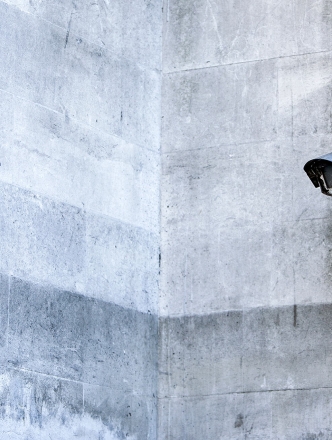
Doctor of Philosophy Media, Culture, and Communication
Grounded in an interdisciplinary approach to the study of media and culture, our doctorate draws from a rich array of disciplines and theoretical frameworks. Department expertise spans the globe: the Middle East, East Asia, the Global South, Africa, and Europe. Our faculty generate some of the most original scholarship in their respective fields, creating a stimulating environment in which to pursue graduate work.

Degree Details
Official degree title.
PhD in Media, Culture, and Communication

Research Focus
Alumni placements, funding for full-time phd students.
Five research areas operate as guiding frameworks for intellectual inquiry across the department: Global Communication and Media, Technology and Society, Visual Culture and Sound Studies, Media Industries and Politics, Interaction and Experience.
Your work as a doctoral student will be shaped by our commitment to:
- Engaging with theoretical concepts from a range of disciplines—media and cultural studies, visual culture, history, science and technology studies, anthropology, sociology, disability studies, sound studies, political science.
- A multi-methodological approach to research—from semiotics, global ethnography, gender and queer theory, critical race theory, qualitative and quantitative discourse analysis, to political/cultural economy, among other critical frameworks.
- A global perspective—conceiving of the global mediascape as transnational and transcultural.
- Recognizing media and technology’s long history and antecedents.
Read some sample dissertation abstracts .
After graduating, alumni join academic departments of media and communication, with placement in the social sciences and interdisciplinary humanities becoming increasingly common. MCC PhDs who graduated in the past ten years are now tenure-track or tenured professors at the University of California, Berkeley; University of Washington, Seattle; Cornell University; Stanford University; UCLA; Rutgers; Fordham; University of Michigan; George Mason University; University of North Carolina; University of Arizona; College of Charleston; Memorial University of Newfoundland; University of San Francisco; Scripps; Pratt; University of Maryland; American University of Beirut; American University of Paris, Ryerson University; Trent University; St. Joseph’s College.
Over the past decade, our PhD graduates have received numerous prestigious postdocs, including a Mellon Postdoctoral Fellowship in the Humanities in the Department of Comparative Media Studies/Writing at MIT; Mellon Postdoctoral Fellowship at MIT's Center for Art, Science, and Technology; Postdoctoral Fellow, Berkman Klein Center, Harvard University; Postdoctoral Researcher, Max Planck Institute for the History of Science; Postdoctoral, Center for Information Technology Policy, Princeton University; Postdoctoral Fellowship at Rice University in Technology, Culture, and Society; Research Associate, Center for Digital Humanities, Princeton University; Postdoctoral Fellow, Media, Inequality & Change Center, University of Pennsylvania.
If you are accepted as a full-time NYU Steinhardt PhD student without an alternate funding source, you are eligible for our competitive funding package, which includes a scholarship and tuition remission. Learn more about our funding opportunities .
Graduate Leadership

Associate Professor of Media, Culture, and Communication; PhD Director

Susan Murray
Department chair and professor of media, culture, and communication.
If you have additional questions about our degree, please contact us at [email protected] .
Alumni Profiles

Jacob Gaboury (PhD 2014)
Jacob is an Assistant Professor in the Department of Film & Media at the University of California, Berkeley. His dissertation "Image Objects: An Archaeology of Computer Graphics, 1965-1979" investigated the early history of computer graphics and the role they play in the move toward new forms of simulation and object oriented design.
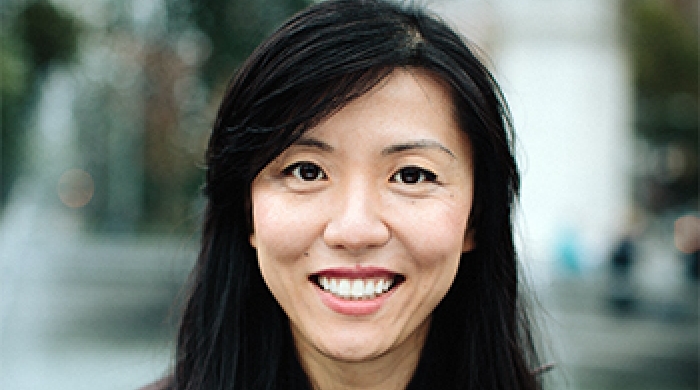
Xiaochang Li (PhD 2017)
Xiaochang is an Assistant Professor in the Department of Communication at Stanford University. Her teaching and research interests include the history of computing and information systems, AI and algorithmic culture, speech and language technology, and software/platform studies. Before joining Stanford, she was a postdoctoral fellow at the Max Planck Institute for the History of Science in Berlin.
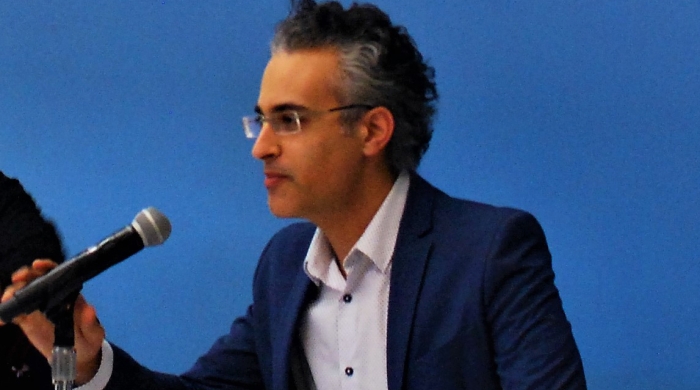
Hatim El-Hibri (PhD 2012)
Hatim is Assistant Professor of Film and Media Studies at George Mason University. His research examines media technologies and urban space in the Middle East. His dissertation traced the history of the visualization of Beirut, from the politics of aerial photography and mapping during the French Mandate, to the visual economy of postwar construction, to the materiality of Hizballah's live satellite television.

Liz Koslov (PhD 2017)
Liz is an Assistant Professor in the Department of Urban Planning and the Institute of the Environment and Sustainability at UCLA. Previously, she was a Mellon Postdoctoral Fellow at MIT. Her research examines the cultural, political, and sociological dimensions of climate change adaptation. Her first book project, Retreat: Moving to Higher Ground in a Climate-Changed City , is under advance contract with the University of Chicago Press.
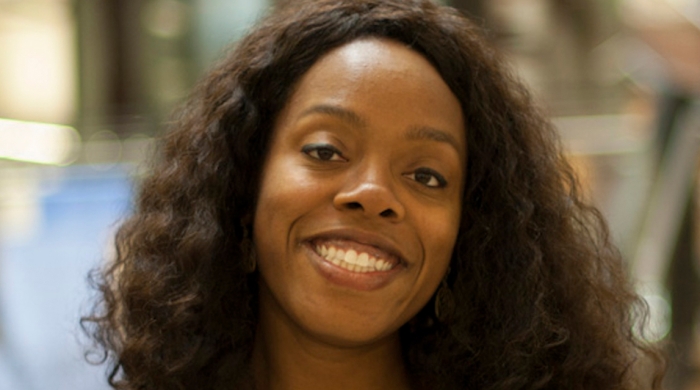
Devon Powers (PhD 2008)
Devon is an Associate Professor in the Departments of Advertising, Media & Communication at Temple University. Powers' research interests include popular music, 20th century history, and cultural intermediation – the people and processes that operate "in between" the production and consumption of culture. Powers completed a fellowship at the University of Leeds in 2014, and was recently elected Vice Chair of the Popular Communication Division of the International Communication Association.

Matthew Powers (PhD 2013)
Matthew is an Associate Professor in the Department of Communication at the University of Washington-Seattle. His dissertation "Humanity's Publics: NGOs, Journalism and the International Public Sphere" examined reporting roles assumed by international NGOs as legacy media outlets cut their foreign news budgets, and received the Gene Burd Outstanding Dissertation in Journalism Studies award from the International Communication Association.

Media, Culture, and Communication
239 Greene Street, 8th floor New York, NY 10003 212-998-5191 | contact
Land Acknowledgement
Take the Next Step
Advance your personal and professional journey – apply to join our community of students.
Browser does not support script.
- Current Students
- Digital Futures for Children

Media@LSE MSc Dissertation Series
This is a selection of the best dissertations authored by students from our MSc programmes.
These MSc dissertations have been selected by the editor and deputy editor of the Media@LSE Working Paper Series and consequently, are not the responsibility of the Working Paper Series Editorial Board.
No 313 The App Keeps the Score: Period-Tracking Apps, Self-Empowerment and the Self as Enterprise , Martina Sardelli
No 312 Envisioning Solidarity: A Critical Discourse Analysis of Chinese NGO Communications on Philanthropic Campaigns , Han Zheng
No 311 Examining the Western Media's Representation of Present-Day China Through the Lense of of Orientalism: A critical discourse analysis on BBC News’ coverage of the 2022 Beijing Winter Olympics , Danrong (Miko) Xiang
No 310 Bodies That Pain: An Emergent Resistance in Neo/Non-Liberal China. Exploring Weibo Hashtag Activism #FacingBirthInjuries From an Affective-Ethical Perspective , Jialu Sun
No 309 'The Algorithm Will Battle Against You': A Qualitative Study on Disabled Content Creators’ Perspectives and Understanding of the Challenges Presented by Algorithmic Systems on Social Media Platforms , Ishana Rhea Ramtohul
No 308 Why They Don't Trust Us: Chilean Mainstream Media, Metajournalistic Discourses and Repairing Journalism , Phillip Duran Pástene
No 307 A ‘Canary in the Coalmine' for Synthethic Media Regulation: The Emerging Threat of Deepfake Image Abuse , Olivia Otts
No 306 Communicating Inside to People from the Outside: How junior international employees in strategic communications companies in London perceive workplace well-being through internal communications , Nam Nghiem
No 305 The Voices That Build America: Theorizing the Labor Union as a Media Technology , Grace Nelson
No 304 "Art on Wheels": A Semiotic and Visual Discourse Analysis of Graffiti on Nairobi’s Matatus , Frank Mutulu
No 303 News Diversity and Morality in the Climate Reparations debate: A Quantitative Content Analysis of British and Irish News Coverage of the COP27 Negotiations about Loss and Damage , Marlene Jacobse
No 302 'We're all going through it': How the Construction of ‘Mental Health’ in One Pandemic HuffPost Series Positions Readers , Clare Lombardo
No 301 F rench Ecocinema and Young Audiences Environmental Mobilistations: An Exploration of the Intersection Between Film and Politics , Lola Messica
No 300 Balancing Digital Selves: Mediated Self-Presentation of Migrant Women in Germany on LinkedIn , Maya Hemant Krishna
No 299 Solidifying Social Immobility: Representation of Sex Workers within Human Trafficking Discourse in the Philippines , Olivia Austria Kemble
No 298 'Give people the power to build community and bring the world closer together': Illusions of A Global village. A Critical Discourse Analysis of Meta Platforms’ Discursive Construction of the Global Citizen , Nelli Jouhki.
No 297 Enabling Empowerment by Establishing Indian Feminity , Sanskriti Bhhatkoti
No 296 The Forces of Development: Communicating Indigenous Identity in Brazil , Alan Gabrielli Azevedo
No 295 Can women really have it all? A Discourse Analysis of Neoliberal Feminist Discourse’s Roles in the Construction of Media Representation of Professional Working Women in Indonesia , Moudy Alfiana
No 294 Framing Utopia In Emerging Technology: A Critical Discourse Analysis of Financial Media Representation of Virtual Reality and Augmented Reality , Chuyue Zhan
No 293 Understanding Brand-Culture Interaction: A Social Semiotic Analysis of an Emerging Form of Brand Communications on Bilibili , Xinyu Yang
No 292 ‘We don’t chase clicks, we chase public interest’: Investigative Journalism Between Democratic Ideals and Economic Realities , Lara Wiebecke
No 291 A Health Risk Community or A Cultural Tourism Destination? A Critical Discourse Analysis of Intertextual Representation of Wanhua District in Taiwanese Mass Media Coverage of 2021 COVID-19 Outbreak in Taipei City and Official Tourism Promotion , Min Tu
No 290 A Duality of Shifting Values in Journalism: ‘Responsible Capitalism’ and Public Service Mission – An Analysis of the News Trade Press , Hanna Siemaszko
No 289 Mediated Social Class Identity Articulation and Performance Over Social Media , Shivani Rao
No 288 Emotions running high – do they catch the reader’s eye? A quantitative content analysis on emotional frames in climate change news – the case of a significant global news publisher’s Cop26 coverage , Sara Nuder
No 287 Selling Surveillance by Fixing Femininity: Exploring the Representation and Discursive Construction of the Gaze Between Women in Indian Advertisements , Vaishnavi Nair
No 286 Development as its own Antithesis: Towards a Multi-disciplinary Exploration of the Neoliberalization of Development , Lisar Morina
No 285 Can creative labor coexist under an industrial capitalist model? A qualitative analysis of worker subjectivity in production work in Vancouver’s film and television industry , Emily Mckenna Arbogast Larman
No 284 Nothing to Hide – Everyone to Suspect: A case study of Neighbor, Neoliberal Security Governance and Securitization , Julia Kopf
No 283 Building a Social Contract for the Network Society: A Discursive Study of How Meta Mediates its Relationship to Users and Society Through Public Policy Communications , Hunter Morgan
No 282 Big Brother Watch’s campaign against COVID Pass and its implications for science communication , Zichen Jess Hu
No 281 “Everyone Was Talking About It”: A Thematic Analysis of Audience Interpretation of Squid Game on IMDb , Junhan Gina Fu
No 280 ‘An Existential Threat’: Right-wing Media and the Formation of Racialised Moral Panics , Sarah Campbell
No 279 ‘Stay at Home, Protect the NHS, Save Lives’: A Critical Discourse Analysis of UK Government Covid-19 press conferences , Morwenna Backhouse
No 278 Datafied Gay Men’s Dating: Ordering of Sexual Sociality on Blued , Hao Wu
No 277 Calculating newsworthiness: Investigating the role that probability plays in newsification and journalistic decision-making , Selina Swift
No 276 Platformisation as Development: Discourse and Justification in the South American Gig Economy , Lucas Stiglich
No 275 Branding for New Futures: Brand Activism’s Mediation of Collective Prospective Remembering , Kelly M. Smith
No 274 ‘It wasn’t meant to be mine, yea?’ – The impacts of automation on the Brazilian Welfare State A case study of the Covid-19 data-driven emergency aid Auxílio Emergencial , Melissa Lima Silva
No 273 ‘Toward a better future’: A critical discourse analysis of the Environmental, Social, and Governance (ESG) reporting on the corporate websites of three large multinational corporations (MNCs) , Kanhai A. Parasharya
No 272 Looking through the mirror: Finding Hybridity in Al Jazeera English’s Journalism Metadiscourse , Zoe Maria Pace
No 271 How many more Emoji do we need? Examining the Unicode Consortium’s Vision of World Standard of Emoji , Yuka Katsumata
No 270 Hate in the Mainstream: Proposing a ‘Keyness-Driven’ Framework to Surface Toxic Speech in the Public Domain , Pica Johansson
No 269 Mapping Networks of Moral Language on U.S. Presidential Primary Campaigns, 2016-2020, Kobi Hackenburg
No 268 The Role of Selective Exposure in ‘A New Era of Minimal Effects’: The Mediating Effect of Selective Exposure on the Relationship between Personal Characteristics and Conspiracy Theory Beliefs , Eunbin Ha
No 267 ‘Thick girls get low’: Representations of gender, fatness, blackness and sexuality in music videos by Lizzo , Alexandra Grinfeld
No 266 We are raising our voices: The use of TikTok for the public self-representation of indigenous identity in Latin America , Camila Figueroa-Zepeda
No 265 The Silenced Sound of Drill The Digital Disadvantage, Neocapitalist Media, and Hyper- Segregation , Alexandra Farje
No 264 Blockchain Island: A critical discourse analysis of the colonial construction of a Puerto Rican crypto utopia , María De Los Milagros Colón Cruz
No 263 From Artists to Creators, From Music to Audio: A Critical Discourse Analysis of Spotify’s ‘Audio First’ Strategy , Ryan Carraro
No 262 Imprisoned by Partisanship? A Critical Discourse Analysis of Media Bias of United States Print and Online Media in Reporting of Bipartisan Issues through the First Step Act , Kimberly Burton
No 261 “This Art of Being French” A Critical Discourse Analysis on Nostalgia and National Identity in Emmanuel Macron’s Speeches , Capucine Bourges
No 260 Freedom for whom? Investigating notions of freedom in European media and communications policy, 1989-2021 , Jakob Angeli
No 259 ‘Inspire Creativity, Enrich Life’? A Critical Discourse Analysis on How Douyin Justifies Its Data Extraction and Shapes Public Values in The Platform Society , Jing An
No 258 Changing Humanitarianism For The Better? Virtual Reality and the Representation of the Suffering ‘Other’ in Humanitarian Communications , Francesca Liberatore Vaselli
No 257 We Are Humans Too: Refugees’ Perceptions of Representations of Migration in European News , Hannah Traussnigg
No 256 The Matter of Online Political Participation: A New Materialist Experiment on Emerging Adult Participatory Practices in the United Kingdom, Ireland and the Netherlands , Hanne M. Stegeman
No 255 Rap Music As Evidence: A Prosecutorial Tactic of Institutionalizing Racism , Claire Ruder
No 254 Put Students Before Your Public Image: A Critical Discourse Analysis of Strategic Communications in the University of Warwick Rape Chat Scandal , Clara Héroux Rhymes
No 253 Set The Record Straight: The Significance of Counter-Archives in Contemporary Struggles of Justice for Apartheid-Era Crimes , Ra’eesa Pather
No 252 Can Stories Change How We Feel About People: The Effect of Older People’s Online Personal Stories on Mitigating Younger Korean Ageism , Jeongwon Leah Park
No 251 The ‘Silent Majority': A Critical Discourse Analysis of Counter-Movement Key Opinion Leaders’ YouTube Coverage of the 2019 Hong Kong Protests , Limichi Okamoto
No 250 Man Up! A Qualitative Analysis of Representations of the Male Body on Instagram and Body Image Among Young Flemish Men , Femke Konings
No 249 Manufacturing The Mapped Metropolis: A Social Semiotic Analysis of Cartographic Representations of Gentrification and Displacement in New York City , Johanne Lahlum Hortman
No 248 The Police Have Confirmed all 39 Victims Were Chinese The Mis/Recognition of Vietnamese Migrants in Their Mediated Encounters Within UK Newspapers , Linda Hien
No 247 Brother A-Zhong For the Win: A Qualitative Analysis of Chinese Fan Communities’ Nationalist Practice of Cyber Expedition , Yannan Du
No 246 Police Facial Recognition in Progress: The Construction of The Notion of Accuracy in the Live Facial Recognition Technology Used by the MET Police in London , Romina Colman
No 245 Polarflation: The Inflationary Effect of Attention-Optimising Algorithms on Polarisation in the Public Sphere , Samuel Caveen
No 244 Out of Sight, Out of Mind: Examining How Representation and Accessibility Impact Each Other With Relation to Visual Impairment , Rebecca Sophie Brahde
No 243 Narrating Economics and The Social Vision of a $100 Billion Fund: A Critical Discourse Analysis of Financial Media Representation of Softbank’s Venture Capital Investments in Digital Technology , Carl Bakenhus
No 242 Look Back in Rebellion: Radical Transparency As Refusal of Surveillance , Beatrice Bacci
No 241 The Quantified (Female) Self: Examining the Conceptualisation of Female Health, Selfhood and Embodiment in Fitbit Strategic Communication Campaigns , Jourdan Webb
No 240 Transitioning from Analogue to Digital Broadcast: A Case Of Communicative Inequality , Boikhutso Tsikane
No 239 “Won’t somebody please think of the children?” A Critical Discourse Analysis of Representations of the Figure of the Child in Western Media Coverage of the Yemeni Conflict , Nadine Talaat
No 238 Embodying Disability: Problematising Empathy in Immersive Experiences of Non-Normative Bodies , Pablo Agüera Reneses
No 237 Democratising Bridge or Elite Medium: An investigation into political podcast adoption and the relationship with cognitive social capital , Steve Rayson
No 236 Manufacturing Consent: An Investigation of the Press Support Towards the US Administration Prior to US-led Airstrikes in Syria , Malavika Mysore
No 235 Intercultural dialogue, ordinary justice and indigenous justice in Bolivia: Between challenges, possibilities or utopias , Johanna Lechat
No 234 When a Woman Meets a Woman: Comparing the Use of Negativity of Female Candidates in Single and Mixed-Gender Televised Debates , Emil Støvring Lauritsen
No 233 “Let me tell you how I see things”: The place of Brexit and the Entente Cordiale in Macron’s strategic narrative of and for France on the international scene , Maud-Lily Lardenois-Macocco
No 232 The Pleasures of Solitude? A qualitative analysis of young Chinese women’s daily-life vlog viewing practices , Yue Jin
No 231 Hegemonic Femininity: A Laughing Matter? A Critical Discourse Analysis of Contemporary Stand-Up Comedy in the United States on the Issue of Female Reproductive Rights , Isabella Hastings
No 230 Nice People Take Drugs: An investigation into the communicative strategies of drug policy reform organisations in the United Kingdom from a social movement perspective , André Belchior Gomes
No 229 The Branded Muslim Woman: A Qualitative Study into the Symbolic Boundaries Negotiated around the Portrayal of Muslim Women in Brand Cultures , Nuha Fayaz
No 228 The Uncertain Decorum of Online Identification: Study in Qualitative Interviews , Samuel DiBella
No 227 Decentring Eurocentrism in Communication Scholarship: A Discursive Analysis of resistance in influential communication journals , Sara Demas
No 226 From Asthetic Criticism to News Reporting: Rethinking the concept of Ecstatic News through the Lens of French Print Cultural Journalism , Elisa Covo
No 225 Datafication of Music Streaming Services: A qualitative investigation into the technological transformations of music consumption in the age of big data , Jingwen Chen
No 224 Transnational, Gendered, and Popular Music in the Arab World: A Content Analysis of a Decade (2010-2019) , Dana J. Bibi
No 223 We the Ragpickers: A case-study of participatory video and counterhegemony , Suyash Barve
No 222 Audience Engagement with Ten Years and the Imagination of Hong Kong Identity: Between Text, Context and Audience , Zhi-Nan Rebecca Zhang
No 221 Straightening out Same Sex Marriage for ‘all’ Australians: A content analysis study of prejudices in Australia's campaign for marriage equality ,Tate Soller
No 220 In Search for ‘Liveliness’: Experimenting with Co-Ocurrence Analysis Using #GDPR on Twitter , Sameeh Selim
No 219 ¿Dónde está mi gente? A qualitative analysis of the role of Latinos in the context of the Hillary for America 2016 presidential campaign , Andrea P. Terroba Rodríguez
No 218 Red, White and Blue for Who? A critical discourse analysis of mainstream media coverage of Colin Kaepernick and Take a Knee , Kim M Reynolds
No 217 ‘Algorithmic Bias’ through the Media Lens: A Content Analysis of the Framing of Discourse , Rocío Izar Oyarzun Peralta
No 216 Civic State of Mind: A Critical Discourse Analysis of Celebrity Language on Citizenship and Democracy , Hannah Menchhoff
No 215 Encoding the Social: A Critical Discourse Analysis of Mark Zuckerberg's Construction of Mediated Sociality , Sam McGeachy
No 214 White for White: An Exploration of Gay Racism on the World's Most Popular Platform for Gay and Bisexual Men , Aubrey T. A. Maslen
No 213 Agent of Change? Malaysian Millenials' Social Media Consumption and Political Knowledge, Participation and Voting in the 2018 General Election , ZiQing Low
No 212 The Netflix Phenomenon in India: A qualitative enquiry into the urban Indian youth's engagement with Netflix , Richa Sarah George
No 211 Do the ‘Rich’ Get Richer? Exploring the Associations between Social Media Use and Online and Offline Political Participation Activities among Kenyan Youth , Eric Gatobu Ndubi
No 210 The Weinstein Effect and mediated non-apologies: Evaluating the role of #MeToo public apologies in western rape culture , Eleanor Dierking
No 209 ‘No Script At All’. A Study of Cultural Context and Audience Perceptions of Authenticity in Reality Television , Yun Ting Choo
No 208 “It’s funny ‘cause it’s true”. A critical discourse analysis on new political satire on television in the United States , Darren Chan
No 207 In a Mediated Society, Can Indigenous Knowledge Survive? A Network Ethnography Examining the Influence of Internet Use on Indigenous Herbal Knowledge Circulation in a Remote Yao Community , Anran Wang
No 206 Beauty and the Blogger: The Impact of Instagram Bloggers on Ideals of Beauty and Self-esteem , Sanjana Ahuja
No 205 Memories of Babri: Competing Discourses and contrasting constructions of a media event , Sanaya Chandar
No 204 Habitus, Social Space and Media Representation: The ‘Romantic’ Contemporary Taiwanese ‘Wenyi Qingnian’ Discourse in the Local Lifestyle Magazine ‘One Day’ , Hoi Yee Chau
No 203 Stories Untold? A qualitative analysis uncovering the representation of girls as victims of conflict in the global south , Tessa Venizelos
No 202 What is the Norm? A study of heteronormative representations in Bollywood , Saachi Bhatia
No 201 Live Streaming and its Audiences in China: Making sense of authenticity , Qisi Zhang
No 200 Berniebros and Vagina Voters: Content Analysis of Gendered Facebook Communication in the 2016 U.S. Democratic Presidential Primary , Meredith Epstein
No 199 ‘Othering’ the ‘Left-Behind’? A Critical Discourse Analysis of the representation of Leave voters in British broadsheets’ coverage of the EU referendum , Louise S. Thommessen.
No 198 Social Media as Civic Deliberation Space: A content analysis study of the public discussion about the legalization of surrogacy on Weibo and Zhihu , Liu Yu
No 197 Stories of Dismantling the White Patriarchy: A thematic narrative analysis of the imagined futures in 2015 science fiction films , Kylie Courtney
No 196 Too Small to Succeed? The Case of #NoAlVotoElectrónico and the Limits of Connective Action , Juan Floreal Graña
No 195 How we remember and forget via Facebook: The Mediatization of Memento and Deletion Practices , Jacopo Villanacci
No 194 Mediated Japanophile? Media consumption and Chinese people’s attitudes towards Japan among different generations , Han Xiao
No 193 Digital Mediatization in the Lifestyle Sport Slacklining , Friedrich Enders
No 192 Recipe for Success: A qualitative investigation into the role of social capital in the gendered food blogosphere , Fiona Koch
No 191 Access and Beyond: An Intersectional Approach to Women’s Everyday Experiences with ICTs , Fatma Matin Khan
No 190 Not Manly Enough: A Quantitative Analysis of Gender Stereotypes in Mexican Political Advertising, 2010‐2016 , Enrique López Alonso
No 189 Loudspeaker Broadcasting as Community Radio: A qualitative analysis of loudspeaker broadcasting in contemporary rural China in the framework of alternative media Shutong Wang
No 188 21st Century Cholos Representations of Peruvian youth in the discourse of El Panfleto Esteban Bertarelli
No 187 Representations of Calendar Girls and An Ideology of Modernity in 1930s Republican Shanghai Yifan Song
No 186 Reality Television as a Neoliberal Technology of Citizenship? A Critical Discourse Analysis of Điều Ước Thứ Bảy Vu Anh Ngoc Nguyen
No 185 Truth on Trial: Indigenous News Media and the Truth and Reconciliation Commission of Canada Tomas Borsa
No 184 No Place Like Home: Analysing Discursive Constructions of ‘Home’ in Canadian Mainstream Newspaper Coverage of the Elsipogtog Protest Brooklyn Tchozewski
No 183 Modiplomacy and Diaspower: The discursive construction of modernity and national identity in Narendra Modi’s communication with the Indian diaspora Saanya Gulati
No 182 “The centre must hold”: Partisan dealignment and the rise of the minor party at the 2015 general election Peter Carrol
No 181 ‘Rapefugees Not Welcome’. Ideological Articulations of Media Discourses on Migrants and Refugees in Europe: New Racism and Othering – A Critical Discourse Analysis Monica Ibrahim
No 180 Constructing Connectivity: A Qualitative Analysis of the Representation of the Connected and Unconnected Others in Facebook’s Internet.org Campaign Minji Lee
No 179 Space and Place: The Communication of Gentrification to Young People in Hackney Kimberley Brown
No 178 Adherence to the protest paradigm? An examination of Singapore’s news coverage of Speakers’ Corner protests from 2000 to 2015 Joann Tan
No 177 The system is rigged: A discursive analysis of Donald Trump and Bernie Sanders Jessica Cullen
No 176 An Examination of American Mainstream Media Discourse of Solidarity and Citizenship in the Reporting of the Black Lives Matter Campaign Eilis Yazdani
No 175 Are All Lives Valued? Worthy 'Us', Unworthy 'Others'. A Comparative Content Analysis of Global News Agencies’. Pictorial Representation of the Paris Attacks and the Beirut Bombings . Dokyum Kim
No 174 Imperial remains: A Critical Discourse Analysis of a Televised Retelling of the Portuguese Colonial Period Beatriz Serra
No 173 Unmasking USAID Pakistan’s Elite Stakeholder Discourses: Towards an Evaluation of the Agency’s Development Interventions Anum Pasha
No 172 Boundary Work between ‘Us’ and ‘Them’ Global News Agencies’ Double Standard on the Construction of Forced Migrants by Geographical Proximity Woo-chul Kim
No 171 Why Did Our Watchdog Fail? A Counter Perspective on the Media Coverage of the 2007 Financial Crisis Tran Thuy-Anh Huynh
No 170 Unmasking ‘Sidekick’ Masculinity: A Qualitative Investigation of How Asian-American Males View Emasculating Stereotypes in U.S. Media Steffi Lau
No 169 The Silence of the Lamb: Animals in Biopolitics and the Discourse of Ethical Evasion Sana Ali
No 168 The Tartan Other: A qualitative analysis of the visual framing of Alex Salmond and the Scottish National Party in the British Press Ross Alexander Longton
No 167 The Unmasking of Burmese Myth in Contemporary Thai Cinema Pimtong Boonyapataro
No 166 Neoliberal Capitalism, Transnationalism and Networked Individualism: Rethinking Social Class in International Student Mobility Nguyen Quynh Tram Doan
No 165 The New Media Elite: How has Participation been Enabled and Limited in Leaders Live Online Political Debates Matilde Giglio
No 164 Constructing a Sense of Place through New Media: A Case Study of Humans of New York Mariele O’Reilly
No 163 The failure of cosmopolitanism and the reinforcement of hierarchical news: managing the visibility of suffering throughout the Multimodal Analysis of the Charlie Hebdo versus the Baga terrorist attacks Maria Paola Pofi
No 162 Imagining (In)security: Towards Developing Critical Knowledges of Security in a Mediated Social World Kathryn Higgins
No 161 Tweens Logged In: How Social Norms and Media Literacy Relate to Children’s Usage of Social Media Kalina Asparouhova
No 160 Finding Ferguson: Geographic Scale in the United States’ National Nightly Network News John Ray
No 159 Solidarity as Irony: Audience Responses to Celebrity Advocacy Isabel Kuhn
No 158 Phantasmagoric Nationalism: State power and the diasporic imagination Felicia Wong
No 157 Investigating Music Consumption ‘Circuits of Practice’ Eva Tkavc Dubokovic
No 156 A complex history turned into a tale of reconciliation: A critical discourse analysis of Irish newspaper coverage of the Queen’s visit to the Republic of Ireland Ciara Spencer
No 155 Economic power of e-retailers via price discrimination in e-commerce: price discrimination’s impact on consumers’ choices and preferences and its position in relation to consumer power Arina Vlasova
No 154 Exploring the Boundaries of Crowd Creation: A study on the value of voice in neoliberal media culture Ana Ecaterina C. Tan
No 153 “Songs of Guilt”: When Generosity is to Blame - A Content Analysis of the Press and Social Media Reactions to U2’s “Songs of Innocence” Giveaway on iTunes Alessandro Volonté
No 152 Hybridity within Peer Production: The Power Negotiation of Chinese Fansub Groups Zongxiao Rong
No 151 Writing On the Wall: Conversations with Beirut's Street Artists Zeina Najjar
No 150 'Gaining Control with the Power of the Gun and Maintaining Control with the Power of the Pen': A Content Analysis of Framing the Cultural Revolution (1966-1976) in the People's Daily Yuanyuan Liu
No 149 Let My Voices be Heard: A Qualitative Study of Migrant Workers' Strategies of Mediation Resistance in Contemporary China Yijun Chen
No 148 'Popular Politics': A Discourse Theory Analysis of Ecuadorian President Rafael Correa's TV/radio Program Citizen Link Veronica Leon Burch
No 147 A Comparative Analysis of Chinese, Western and African Media Discourse in the Representation of China's Expansion of Economic Engagements in Africa Tong Wei
No 146 Ideological Trafficking of God and the Other Sultana Haider
No 145 The Maasai and the Internet: Online Civil Participation and the Formation of a Civic Identity in Rural Kenya Stine Ringnes Wilhelmsen
No 144 Wood in Water Does Not a Crocodile Make: Migrants Virtual Place-making, Ontological Security and Cosmopolitanism in the Transnational Social Field Sheetal Kumar
No 143 Droning On: A Critical Analysis of American Policy and News Discourse on Drone Strikes Sadaf Khan
No 142 The Impact of Mass Media Sentiments on Returns and Volatility in Asset Markets: Evidence from Algorithmic Content Analysis Panu Kuuluvainen
No 141 Problematising the Self-Representation of Race and Gender in Vines: Who has the Last Laugh? Shaikha Nurfarah Mattar
No 140 Corporate Public Apologies, or Capitalism in Other Words Nina M Chung
No 139 Agenda Setting and Framing in the UK Energy Prices Debate Nicholas Davies
No 138 'It is of Inestimable Benefit': Communicating American Science Policy in the Post-Cold War Era Mercedes Wilby
No 137 Beyond Twenty Cents: The Impact of the Representation of Violence on the Coverage of the Brazilian Protests of June 2013 by the Mass Media Margarida Gorecki Telles
No 136 Framing Françafrique: Neo-colonial Framing Practices in Le Monde 's Coverage of the French Military Interventions in Mali and the Central African Republic Lucie Gagniarre
No 135 Representing Persia: A Discourse Analysis of The American Print Media's Coverage of Iran Kyle Bowen
No 134 From Fat Cats to Cool Cats: CEOs and Micro-celebrity Practices on Twitter Julia Regina Austmann
No 133 Critically Imagining Ineternet Governance: A Content Analysis of the Marco Civil da Internet Public Consultation João Carlos Magalhães
No 132 The Ambiguous ICT: Investigating How Tablet Users Relate to and Interact with Their Device Jessica Blank
No 131 Threats, Parasites and Others: The Visual Framing of Roma Migrants in the British Press Grace Waters
No 130 Fifty Years of Negativity: An Assessment of Negative Compaigning in Swedish Parlimentary Election Campaigns 1956-2006 Gustav Gidenstam
No 129 The Talking Dog: Representations of Self and Others in Japanese Advertising Eryk Salvaggio
No 128 The Selfie Protest: A Visual Analysis of Activism in the Digital Age Clare Sheehan
No 127 Negativity and Australian Political Discourse: A Case Study of the Australian Liberal Party's 2013 Election Television Advertising Clare Creegan
No 126 What are You Laughing at? A Social Semiotic Analysis of Ironic Racial Stereotypes in Chappelle's Show Cindy Ma
No 125 Reconsidering Agenda Setting and Intermedia Agenda Setting from a Global Perspective: A Cross-National Comparative Agenda Setting Test Christoph Rosenthal
No 124 Big Data Exclusions and Disparate Impact: Investigating the Exclusionary Dynamics of Big Data Phenomenon Charly Gordon
No 123 Tabloidisation of the Norwegian News Media: A Quantitative Analysis of Print and Online Newspaper Platforms Celine Storstad Gran
No 122 Red, White and Afro Caribbean: A Qualitative Study of Afro-Caribbean American Identity During the Olympic Games Ashley Gordon
No 121 The City without Gates: Facebook and the Social Surface Andrew Crosby
No 120 Yes I Do Mind: Constructing Discourses of Resistance against Racial Microaggressions on Tumblr Abigail Kang
No 119 Tensions in Urban Street Art: a Visual Analysis of the Online Media Coverage of Banksy Slave Labour Elisabetta Crovara
No 118 The Sticky Case of Sticky Data: An Examination of the Rationale, Legality, and Implementation of a Right to Data Portability Under European Competition Law Paul T. Moura
No 117 Pinning Pretty: A Qualitative Study of Pinterest Users' Practices and Views Elizabeth White
No 116 Comparing Perceptions of NGOs and CSR: Audience Evaluations and Interpretations of Communications Gitanjali Co Devan Anderson
No 115 What is Web-Populism doing to Italian Politics? The Discursive Construction of 'Grillini' vis-a-vis the Antagonist Other Isadora Arredondo
No 114 Yellow Skin-White Prison: A Content Analysis of French Television News Broadcast Ngo Bossoro
No 113 A Revisionist Turkish Identity: Power, Religion and Ethnicity as Ottoman Identity in the Turkish series Muhteşem Yüzyıl Esra Doğramacı
No 112 Behind the Curtain: Women's Representations in Contemporary Hollywood Reema Dutt
No 111 From Liberal Conservative to Conservative Conservative : David Cameron's Political Branding Ignacio José Antonio López Escarcena
No 110 'Micropolitics' and Communication: An Exploratory Study on Student Representatives' Communication Repertoires in University Governance Nora Kroeger
No 109 Ideology No More: A Discourse of Othering in Canadian Mainstream Newspaper Representations of the Idle No More Movement Christian Ledwell
No 108 Media Representation of Nationalism and Immigration: A Case Study of Jamie's Great Britain Xin Liang
No 107 You're Not Alone : Virtual Communities, Online Relationships & Modern Identities in the Military Spouse & Blogging Community Elizabeth M. Lockwood
No 106 Harperist Discourse: Creating a Canadian 'Common Sense' and Shaping Ideology Through Language Mashoka Maimona
No 105 The Spiral of Silence and Social Media: Analysing Noelle-Neumann's Phenomenon Application on the Web during the Italian Political Elections of 2013 Cristina Malaspina
No 104 Participatory Culture on YouTube: A Case Study of the Multichannel Network Machinima Bryan Mueller
No 103 Up the Cascade: Framing of the Concession of the Highway between San Jose and San Ramon Marie Garnier Ortiz
No 102 Science in the Headlines: The Stakes in the Social Media Age Sasjkia Otto
No 101 Representing Disease: An Analysis of Breast Cancer Discourse in the South African Press Lauren Post
No 100 Blob and Its Audience: Making Sense of Meta-Television Giulia Previato
No 99 Streaming the Syrian War: A Case Study of the Partnership between Professional and Citizen Journalists in the Syrian Conflict Madeline Storck
No 98 Immigration Policy Narratives and the Politics of Identity: Causal Issue Frames in the Discursive Construction of America's Social Borders Felicity P. Tan
No 97 Behind 'gift-giving': The Motivations for Sharing Fan-Generated Digital Content in Online Fan Communities Mengchu Wang
No 96 Smartphone Location-based Services in the Social, Mobile, and Surveillance Practices of Everyday Life Carey Wong
No 95 The Impacts of Design on Voluntary Participation: Case Studies of Zimuzu and Baike Li Zeng
No 94 Mediated Politics and Ideology: Towards a New Synthesis. A case study from the Greek General Election of May 2012 Angelos Kissas
No 93 E-Arranged Marriages: How have Muslim matrimonial websites affected traditional Islamic courting methods? Ayesha Ahmed
No 92 Hospitality in the Modern Mediapolis: Global Mediation of Child Soldiers in central and east Africa Bridgette Bugay
No 91 Media Framing of the 2009-2010 United States Health Care Reform Debate: A Content Analysis of U.S. Newspaper Coverage Christina Brown
No 90 Behind the Laughter: Mediating Hegemony through Humour Ningkang Wang
No 89 Saving Europe online? European identity and the European Union’s Facebook communication during the eurozone crisis Johannes Hillje
No 88 Like it? Ritual Symbolic Exchange Using Facebook’s ‘Like’ Tool Kenneth J. Gamage
No 87 Understanding representations of low-income Chinese migrant workers through the lens of photojournalists Lee Zhuomin
No 86 The Modernization of Irish Political Campaigning: The 2011 General Election Liam Murphy
No 85 Online Freedom?Film Consumption in the Digital Age Luane Sandrin Gauer
No 84 Audience Reception of Charity Advertising: Making Sense, Interpreting and Decoding Advertisements That Focus on Human Suffering Magdalini Tsoutsoumpi
No 83 Beneath the Anthropomorphic Veil: Animal Imagery and Ideological Discourses in British Advertising Manjula Kalliat
No 82 Mobile Discourses: A Critical Discourse Analysis on Reports of Intergovernmental Organizations Recommending Mobile Phones for Development Maria Paola de Salvo
No 81 We the People: The role of social media in the participatory community of the Tea Party movement Rachel Weiler
No 80 SOPA Deliberation on Facebook: Deliberation and Facilitation or Mere Mobilization? Ray Wang
No 79 Discerning the Dominant Discourse in the World Summit on the Information Society Ria Sen
No 78 The impact of online health information on the doctor-patient relationship. Findings from a qualitative study Susanne Christmann
No 77 The Influence of Weibo Political Participations on the Political Efficacies of Weibo Users Wenxu Wang
No 76 In what Forms and Patterns does Inequality Exist in the Weibosphere? Xiao Han
No 75 Creating Scandal to Avoid Panic: How the UK Press Framed the News of the World Phonehacking Scandal Zuzanna Natalie Blaszkiewicz
No 74 Measuring media pluralism in the convergence era: The case of News Corp’s proposed acquisition of BSkyB Davide Morisi
No 73 Observers, Witnesses, Victims or Activists? How Inuit Voices are Represented in Mainstream Canadian Newspaper Coverage of Global Warming Patricia H. Audette-Longo
No 72 Global journalism, local realities: Ugandan journalists' views on reporting homosexuality Rachael Borlase
No 71 Why pay if it's free? Streaming, downloading, and digital music consumption in the "iTunes era" Theodore Giletti
No 70 Peacebuilding and Public Service Media: Lessons from Star Radio and media development in Liberia Elizabeth Goodfriend
No 69 The Discourse of Protest: Using discourse analysis to identify speech acts in UK broadsheet newspapers Stefan Brambilla Hall
No 68 Life With or Without the Internet: The Domesticated Experiences of Digital Inclusion and Exclusion Mark Holden
No 67 We are all well (and undisrupted) in the shelter - the 33 of us: Narratives in the rescue of the Chilean Miners as a Live Media Event César Antonio Jiménez Martínez
No 66 Critical Failure: Class, Taste and the Value of Film Criticism Moses Lemuel
No 65 The Story of Egypt: Journalistic impressions of a revolution and new media power Thomas Ledwell
No 64 Political Fandom in the Age of Social Media: Case Study of Barack Obama's 2008 Presidential Campaign Komal H. Parikh
No 63 Against all odds: Evidence for the 'true' cosmopolitan consumer A cross-disciplinary approach to investigating the Cosmopolitan Condition Saskia Scheibel
No 62 Relating to 'Ohio' in Political Advertisements: Interpreting Representations of Culture in Narratives, Myths, and Symbols from Democratic Spots in the 2010 Gubernatorial Campaign Daniel Schwarz
No 61 Youth Understanding of Climate: Towards a theory of social adaptation to climate change in Africa Hardi Shahadu
No 60 Translating China:A case study of Chinese-English translation in CCTV international broadcasting Yueru Zhang
No 59 From watchdog to lapdog?The impact of government intimidation on the public watchdog performance of peace media in processes of democratisation Michael Spiess
No 58 From Hardback to Software: How the Publishing Industry is Coping with Convergence Lauren Christina Sozio
No 57 Witnessing War: Blogs from Soldiers in Iraq and Afghanistan Jessica Siegel
No 56 Mediated Cosmopolitanism? The Other’s Mediated Dialogical Space on BBC World’s Hardtalk Andrew Rogers
No 55 Reconceptualising IT? Policy Learning and Paradigms of Sustainability in the ICT Policy of the European Union Jussi Nokkala
No 54 ‘Alive with Possibility’: Brand South Africa and the Discursive Construction of South African National Identity Yasuko Murai
No 53 The Journalistic Identities of Liveblogging A Case Study: Reporting the 2009 Post-Election Protests in Iran David McDougall,
No 52 Blogging the Gap: A survey of China bloggers Kerry Arnot
No 51 Young People’s Adoption and Consumption of a Cultural Commodity – iPhone Hui Jiang
No 50 Preserving the Liberal World Order in an Age of Globalization: Representing the People’s Republic of China in the American Prestige Press Jasmine Chan
No 49 In the Name of Allah? Alison Jarrett
No 48 An Investigation into the Meaning of Locally Produced Entertainment Media to Lebanese Women:A Concentration on the Film Sukkar Banat (Caramel) Carol Haidar
No 47 ‘Discuss This Article!’ Participatory Uses of Comment Sections on SPIEGEL ONLINE: A Content Analysis Eilika Freund
No 46 Fleeting Racialisation?: Media Representation of African Americans During the California Proposition 8 Campaign - App 1 - App 2 Tiana Epps-Johnson
No 45 The Big Society Will Not Take Place: Reading Postmodernism in Contemporary Conservative Discourse Matthew Eisner Harle
No 44 Situating the imagination:Turkish soap operas and the lives of women in Qatar Dima Issa
No 43 guardian.co.uk: online participation, ‘agonism’ and ‘mutualisation’ Mariam Cook
No 42 Freedom or intervention: What is the role of the regulator in achieving competitive pay-TV markets? Yi Shen Chan
No 41 The united states of unscreened cinema: The political economy of the self-distribution of cinema in the U.S. Bajir Cannon
No 40 Constructing the virtual body: Self-representation, self-modification and self-perfection in pro-eating disorder websites Gillian Bolsover
No 39 The Altruistic Blockbuster and the Third-World Filmstar Olina Banerji
No 38 The Modernisation of Australian Political Campaigns: The Case of Maxine McKew Evie Watt
No 37 Platform-based Open Innovation Business Models: Bridging the gap between value creation and value capture Michael Seminer
No 36 Transmit/Disrupt: Why does illegal broadcasting continue to thrive in the age of liberalised spectrum? Justin Schlosberg
No 35 Domestic Conflict or Global Terror? Framing the Mumbai Terror Attacks in the U.S. Print Press Kamla Pande
No 34 Information plurality, the financial sector, and the fate of Reuters News agency: Policy and problems surrounding the Thomson Reuters merger Leila Lemghalef
No 33 The Contested Framing of Canada’s Military Mission in Afghanistan: The News Media, the Government, the Military and the Public Brooks Decillia
No 32 UK community radio: policy frames and outcomes Helen Charles
No 31 Bunny Talk: Teenagers Discuss The Girls Next Door Jennifer Barton
No 30 Psephological Peer Production Tim Watts
No 29 Domestication of the Cell Phone on a College Campus: A Case Study Madhuri Shekar
No 28 The Visuals of Violence Sofie Scheerlinck
No 27 All Work and No Play - Does it Make Jack a Dull Boy? Ece Inanç
No 26 Perusing Perez: How do Taste Hierarchies, Leisure Preferences and Social Status Interact among visitors to Perez Hilton's Celebrity Gossip Blog? Ellen Hunter
No 25 Exploring the 'Americanization of Political Campaigns: Croatia's 2003 and 2007 General Elections Milly A. Doolan
No 24 Acts of Negotiation Rajana Das
No 23 Banal Environmentalism: Defining and Exploring an Expanded Understanding of Ecological Identity, Awareness, and Action Ryan Cunningham
No 22 Letting the Other Solitude be Heard: On the Media's Role as a Forum for Multilingual Conversation in Canada Marc Chalifoux
No 21 Multilateral Institutions and the Recontextualization of Political Marketing: How the World Intellectual Property Organization's Outreach Efforts Reflect Changing Audiences Sandra Bangasser
No 20 Branding in Election Campaigns: Just a Buzzword or a New Quality of Political Communication? Manuel Adolphsen
No 19 A Study on Self-regulatory Initiatives in China's Internet Industry Lijun Cao
No 18 An Exploration of the 2006 Electoral Campaign for the Re-election of Walter Veltroni for Mayor of Rome Maddalena Vianello
No 17 Creating Global Citizens? The Case of Connecting Classrooms Mandeep Samra
No 16 Audience Reception of Health Promoting Advertising Cristian Raftopoulou
No 15 The Game of (Family) Life: Intra-Family Play in the World of Warcraft Holly Peterson
No 14 Global TV and Local Realities: Constructing Narratives of the Self Sunandini Pande
No 13 Twitter: Expressions of the Whole Self Edward Mishaud
No 12 Crowdsourced News: The Collective Intelligence of Amateurs and The Evolution of Journalism Melissa Metzger
No 11 To Support or Distort: An Analysis of Ontario Referendum Campaign Websites Anna Mather
No 10 Political Handbags: The representation of women politicians Eva Markstedt
No 9 Free Speech, Political Correctness and the Public Sphere in a Talk Radio World Michele Margolis
No 8 Propaganda, Grassroots Power, or Online Public Sphere? Zheng Liu
No 7 Preventing Drug Abuse in China: Anti-Drug Campaigns in the Eyes of a Drug User Bo Li
No 6 Taming Technology: Ultra-Orthodox Jewish Families and Their Domestication of the Internet Josh Hack
No 5 Keeping up Appearances: Candidate Self-Presentation through Web Videos in the 2008 US Presidential Primary Campaign Nisha Gulati
No 4 The End of the Media's '"War on Terror"? An Analysis of a Declining Frame Dominik Cziesche
No 3 Fantasizing Reality: Wetware, Social Imaginaries, and Signs of Change Jennifer Cross
No 2 The Colbert Nation: A Democratic Place to be? Kristen Boesel
No 1 Media Constructions of Extreme Female Thinness Nelly Abranavel
- How it works

Useful Links
How much will your dissertation cost?
Have an expert academic write your dissertation paper!
Dissertation Services

Get unlimited topic ideas and a dissertation plan for just £45.00
Order topics and plan

Get 1 free topic in your area of study with aim and justification
Yes I want the free topic

Journalism Dissertation Topics – Get a Research Based Topic
Published by Owen Ingram at January 2nd, 2023 , Revised On August 11, 2023
Coming up with original journalism dissertation topics for your undergraduate, Master or PhD degree can be a very frustrating experience . In contrast to other disciplines, journalism dissertations are judged based on the interviewee’s quality of information.
A journalism dissertation must be more than just a statement of theoretical knowledge; it must be genuine and applicable.
Are you trying to find the ideal subjects for journalism research? Improve your grade in the dissertation project by using these journalistic research questions and topics.
Other Useful Links:
- Law Dissertation Topics
- Human Rights Law Dissertation Topics
- Business Law Dissertation Topics
- Employmeny Law Dissertation Topics
- Contract Law Dissertation Topics
- Commercial Law Dissertation Topics
- EU Law Dissertation Ideas
- Sports Law Dissertation Topics
- Medical Law Dissertation Topics
- Maritime Law Dissertation Topics
Unique Journalism Topics
- By depicting women as materialistic things, how does the media help perpetuate stereotyped depictions of women?
- Discuss how powerful individuals influence the freedom of media and journalist
- Talk about the main issues that journalists face when performing their jobs
- What impact has advances in science and technology had on journalism?
- How many journalists alter the idea that women are materialistic?
- Can journalism be utilized to advance disadvantaged groups in society?
- What impact do online media outlets have on journalism today?
- Do you think social media is displacing print media?
- How has technology changed the methods through which journalists communicate with their audience?
- How do well-known people affect the freedom of the press and journalists?
- Describe the difficulties faced daily by journalists working in a variety of geographical settings
- How can journalists better inform the public about current events?
- What part does the media play in lowering crime?
- Talk about how the media has a bad impact on violence
- What connection is there between media and the expansion of the fashion sector?
- What is the media’s subsequent effect on the expansion of an economy?
- What do you think about denying political media outlets a license to operate?
- Consider the effects of media on your life during the past 10 years
- Describe how media violence could be advantageous compared to the violence that is affected by society
- Examine how the media sector has changed as a result of technological development
Best Journalism Topics
- Examine the arguments against headlines employing metaphors by media outlets
- How media psychology relates to communication
- Describe how the media has influenced the music industry’s expansion
- Examine how the media has influenced advancements
- Describe the effects of biased media and why it could be harmful to society
- Examine how the media has violated people’s rights and freedoms
- Look at the Black Lives Matter movement and how the media has contributed to its growth
- Consider the impact of media on the dwindling of traditions and culture
- Why does political antagonism between political subjects and classes need to be promoted through the media?
- What part does the media play in encouraging educational activities?
- What part does the media play in raising awareness?
- Describe how readers may check the accuracy and legitimacy of news stories.
- Discuss the role of the media in a nation’s development
- Describe the influence that social media has had on how police brutality instances are reported
- What effect did the media have on the size of the Vietnam War?
- Identify if governments should have the only authority to censor journalists and news reporters
- Describe the key problems that journalism faces
- Examines if media outlets are to blame for the dissemination of unfounded rumours
Investigative Journalism Topics
- How reporters may continue to produce high-quality work without necessarily spending more
- Nigeria is a case study of how the media is assisting in the rebranding of some nations
- How powerful politicians influence some media outlets’ important choices
- An evaluation of the issues limiting information freedom in emerging nations
- How is sexual material used on the front pages of health publications to draw readers?
- How to utilise magazine covers to increase sales
- What moral distinctions exist between the invasion of privacy and investigative journalism?
- An examination of the major players in modern media organisations
- How do politicians in developing nations continue to seduce the populace with nebulous assurances about the quality of the educational system and the development of jobs?
- How call centres are using the media to fill employment and aid the unemployed in society
- Politicians lack the ideological motivation they formerly did. A careful examination of the way political parties promote their views
- Can Pakistan, Iraq, and Afghanistan repair their unfavourable reputations in the world?
Hot Journalism Topics
- Consider some of the most major upcoming shifts in journalism.
- Describe the many advantages that commercials and product promotions have for media sources.
- Why is it inappropriate for superstars and celebrities to go through media trials?
- Define stylised writing and explain if it is appropriate in the internet-dependent world of today.
- Talk about the potentially harmful effects that media may have on pupils.
- Explain why sexual stuff should no longer be broadcasted on television.
- Consider how the media shapes how social issues like racism are expressed.
- Examine the effect of new media on spending for digital learning.
- Ask if it’s possible to pursue the truth in journalism without violating the journalistic code.
- Discuss how the media affects a person’s emotional and psychological health.
- Talk about the primary difficulties that journalists face when carrying out their duties.
- What effect has science and technological progress had on journalism?
- What can reporters do to disprove the notion that women are materialistic?
- Describe how foreign enemies and rivals are presented in American media
- Do people read less about current affairs now that there’s the internet?
- Why has news reporting altered as a result of the internet?
- Examine some of the most important and expected impending advancements in journalism
- Nigeria serves as a case study for how the media helps some countries rebrand.
- A case study on the societal problem of pollution and the role of the media in addressing
- Look into the effects of the fear caused by crime reporting in the media
- Talk about how the media is used to set the agenda
- Describe the issues with how black women are portrayed in the media
- Talk about how women and their sexuality are used in advertising in the media
Journalism & Freedom of Expressions Topics
- Journalists depend on sources for their work. Should these sources be shielded from situations that can lead to a breach of confidence by the laws protecting freedom of expression?
- A principle of the First Amendment to the United States Constitution encourages a highly balanced approach to media and freedom of expression. Should the UK follow their example?
- Exist any reasons for restricting a journalist’s freedom of expression in the name of a democratic society?
- Some contend that a democratic society’s cornerstones are freedom of speech and the press. A comparison of how people in the US and the UK feel about press freedom
- Do tabloids and broadsheets have varying degrees of freedom of speech? The Times against The News of the World
- The common law grants people of the UK a restricted right to free speech. What effect does this have on journalism in the nation?
- How courts trample on journalists’ right to free speech is highlighted by the Sunday Times v. UK case. How can courts protect journalists more fully?
- Article 10 of the Human Rights Convention guarantees the right to freedom of speech. Can journalists use this law to their advantage?
Hire an Expert Writer
Orders completed by our expert writers are
- Formally drafted in an academic style
- Free Amendments and 100% Plagiarism Free – or your money back!
- 100% Confidential and Timely Delivery!
- Free anti-plagiarism report
- Appreciated by thousands of clients. Check client reviews

You can choose any topic from the list of excellent journalism dissertation topics and ideas. Place your order with us if you are unsure of what to write about or how to create a research paper on journalism.
Make use of our dissertation writing service right away to receive a top-notch, original assignment that will be delivered on time and at a reasonable cost. We guarantee to deliver nothing but excellence.
Free Dissertation Topic
Phone Number
Academic Level Select Academic Level Undergraduate Graduate PHD
Academic Subject
Area of Research
Frequently Asked Questions
How to find journalism dissertation topic.
To discover a journalism dissertation topic:
- Analyse media landscape changes.
- Investigate journalistic ethics.
- Examine media’s societal role.
- Explore digital innovations.
- Focus on niche interests.
- Select a topic resonating with your passion and career aspirations.
You May Also Like
Whether you are a die-hard fan or part of a sports brand, you will need sports marketing at some point. The most challenging aspect of sports marketing is securing and activating sponsorships, building relationships with customers, and getting brand approvals.
What can fashion marketing do for your fashion apparel brand? Fashion and accessories have been trends for a long time, but not all brands know how to use them effectively.
Need interesting and manageable Business dissertation topics or thesis? Here are the trending Business dissertation titles so you can choose the most suitable one.
USEFUL LINKS
LEARNING RESOURCES

COMPANY DETAILS

- How It Works
- Bibliography
- More Referencing guides Blog Automated transliteration Relevant bibliographies by topics
- Automated transliteration
- Relevant bibliographies by topics
- Referencing guides
Research Topics & Ideas: Journalism
50 Topic Ideas To Kickstart Your Research Project

If you’re just starting out exploring journalism-related topics for your dissertation, thesis or research project, you’ve come to the right place. In this post, we’ll help kickstart your research by providing a hearty list of journalism-related research ideas , including examples from recent studies.
PS – This is just the start…
We know it’s exciting to run through a list of research topics, but please keep in mind that this list is just a starting point . These topic ideas provided here are intentionally broad and generic , so keep in mind that you will need to develop them further. Nevertheless, they should inspire some ideas for your project.
To develop a suitable research topic, you’ll need to identify a clear and convincing research gap , and a viable plan to fill that gap. If this sounds foreign to you, check out our free research topic webinar that explores how to find and refine a high-quality research topic, from scratch. Alternatively, consider our 1-on-1 coaching service .

Journalism-Related Research Topics
- Analyzing the impact of social media on news consumption patterns among millennials.
- Investigating the role of investigative journalism in combating political corruption.
- The impact of digital transformation on traditional print media business models.
- Examining the ethical challenges of undercover reporting in investigative journalism.
- The role of citizen journalism in shaping public opinion during major political events.
- Analyzing the effectiveness of fact-checking platforms in combating fake news.
- The impact of smartphone journalism on the quality of news reporting.
- Investigating the representation of minority groups in mainstream media.
- The role of photojournalism in humanizing the impacts of climate change.
- Analyzing the challenges of maintaining journalistic objectivity in conflict zones.
- The impact of artificial intelligence on newsroom operations and reporting.
- Investigating the influence of media ownership on editorial independence.
- The role of journalism in shaping public policy on environmental issues.
- Analyzing the portrayal of mental health issues in news media.
- The impact of live streaming technology on broadcast journalism.
- Investigating the challenges faced by freelance journalists in the digital era.
- The role of journalism in promoting government accountability in emerging democracies.
- Analyzing the effects of sensationalism in news reporting on public trust.
- The impact of virtual reality technology on immersive journalism.
- Investigating the role of press freedom in protecting human rights.
- The challenges of reporting on science and technology in mainstream media.
- Analyzing gender representation in sports journalism.
- The impact of media consolidation on diversity of perspectives in news.
- Investigating the ethical implications of drone journalism.
- The role of independent media in fostering democratic processes.

Journalism-Related Research Ideas (Continued)
- Analyzing the portrayal of immigration in national news outlets.
- The impact of censorship and media regulation on journalistic practices.
- Investigating the role of podcasts in the future of journalism.
- The challenges and opportunities of bilingual reporting in multicultural societies.
- Analyzing the dynamics of news reporting in authoritarian regimes.
- The impact of audience analytics on news content and presentation.
- Investigating the implications of deepfake technology for journalistic integrity.
- The role of local journalism in community engagement and development.
- Analyzing the effects of journalism on public health awareness campaigns.
- The impact of economic pressures on investigative journalism.
- Investigating the challenges of reporting in a polarized political climate.
- The role of media literacy in fostering critical thinking among audiences.
- Analyzing the influence of celebrity journalism on cultural values.
- The impact of cross-platform journalism on audience reach and engagement.
- Investigating the effects of social media algorithms on news distribution.
- The role of data journalism in enhancing transparency and public understanding.
- Analyzing the impact of crowd-sourced journalism on news authenticity.
- The challenges of balancing speed and accuracy in digital news reporting.
- Investigating the role of international correspondents in the digital age.
- The impact of public relations practices on journalistic independence.
- Analyzing the representation of LGBTQ+ issues in mainstream journalism.
- The role of journalism in addressing societal issues like homelessness and poverty.
- Investigating the effects of editorial bias in shaping public perception.
- The impact of journalism on political activism and social movements.
- Analyzing the challenges of maintaining journalistic standards in entertainment reporting.
Recent Journalism-Related Studies
While the ideas we’ve presented above are a decent starting point for finding a research topic, they are fairly generic and non-specific. So, it helps to look at actual studies in the journalism space to see how this all comes together in practice.
Below, we’ve included a selection of recent studies to help refine your thinking. These are actual studies, so they can provide some useful insight as to what a research topic looks like in practice.
- Imagination, Algorithms and News: Developing AI Literacy for Journalism (Deuze & Beckett, 2022)
- Evaluation of the Effect of a Live Interview in Journalism Students on Salivary Stress Biomarkers and Conventional Stress Scales (Roca et al., 2022)
- Professional and Personal Identity, Precarity and Discrimination in Global Arts Journalism (Sharp & Vodanovic, 2022)
- The Impact of Information and Communication Technologies on Journalism in the Digital Ara A Descriptive and Critical Approach (Chettah et al., 2022)
- Women in Mass Communication (Creedon & Wackwitz, 2022)
- Newsgames: Experiential Reality, Ludenic News Reading, Conflict of Purposes and Norms (Cengi̇z & Kaya, 2022)
- Deep Journalism and DeepJournal V1.0: A Data-Driven Deep Learning Approach to Discover Parameters for Transportation (Ahmad et al., 2022)
- A View From the Trenches: Interviews With Journalists About Reporting Science News (Anderson & Dudo, 2023)
- Understanding Journalisms: From Information to Entertainment by Persuasion and Promotion (Bernier, 2022)
- Role of educational institutions in promoting medical research and publications in Pakistan (Aslam, 2022)
- Ethics for Journalists (Keeble, 2022)
- “I Felt I Got to Know Everyone”: How News on Stage Combines Theatre and Journalism for a Live Audience (Adams & Cooper, 2022)
- Newsafety: Infrastructures, Practices and Consequences (Westlund et al., 2022)
- The Golden Age of American Journalism (Alent’eva et al., 2022)
- Advancing a Radical Audience Turn in Journalism. Fundamental Dilemmas for Journalism Studies (Swart et al., 2022)
- Mcluhan’s Theories and Convergence of Online and Papers’ Newsrooms (Barceló-Sánchez et al., 2022)
- Scientific communication after the COVID-19 crisis: TikTok publishing strategies on the transmedia board (Neira et al., 2023)
As you can see, these research topics are a lot more focused than the generic topic ideas we presented earlier. So, for you to develop a high-quality research topic, you’ll need to get specific and laser-focused on a specific context with specific variables of interest. In the video below, we explore some other important things you’ll need to consider when crafting your research topic.
Get 1-On-1 Help
If you’re still unsure about how to find a quality research topic, check out our Research Topic Kickstarter service, which is the perfect starting point for developing a unique, well-justified research topic.

You Might Also Like:

Submit a Comment Cancel reply
Your email address will not be published. Required fields are marked *
Save my name, email, and website in this browser for the next time I comment.
- Print Friendly
- Fellowships
- Business Models
- Mobile & Apps
- Audience & Social
- Aggregation & Discovery
- Reporting & Production
- Translations
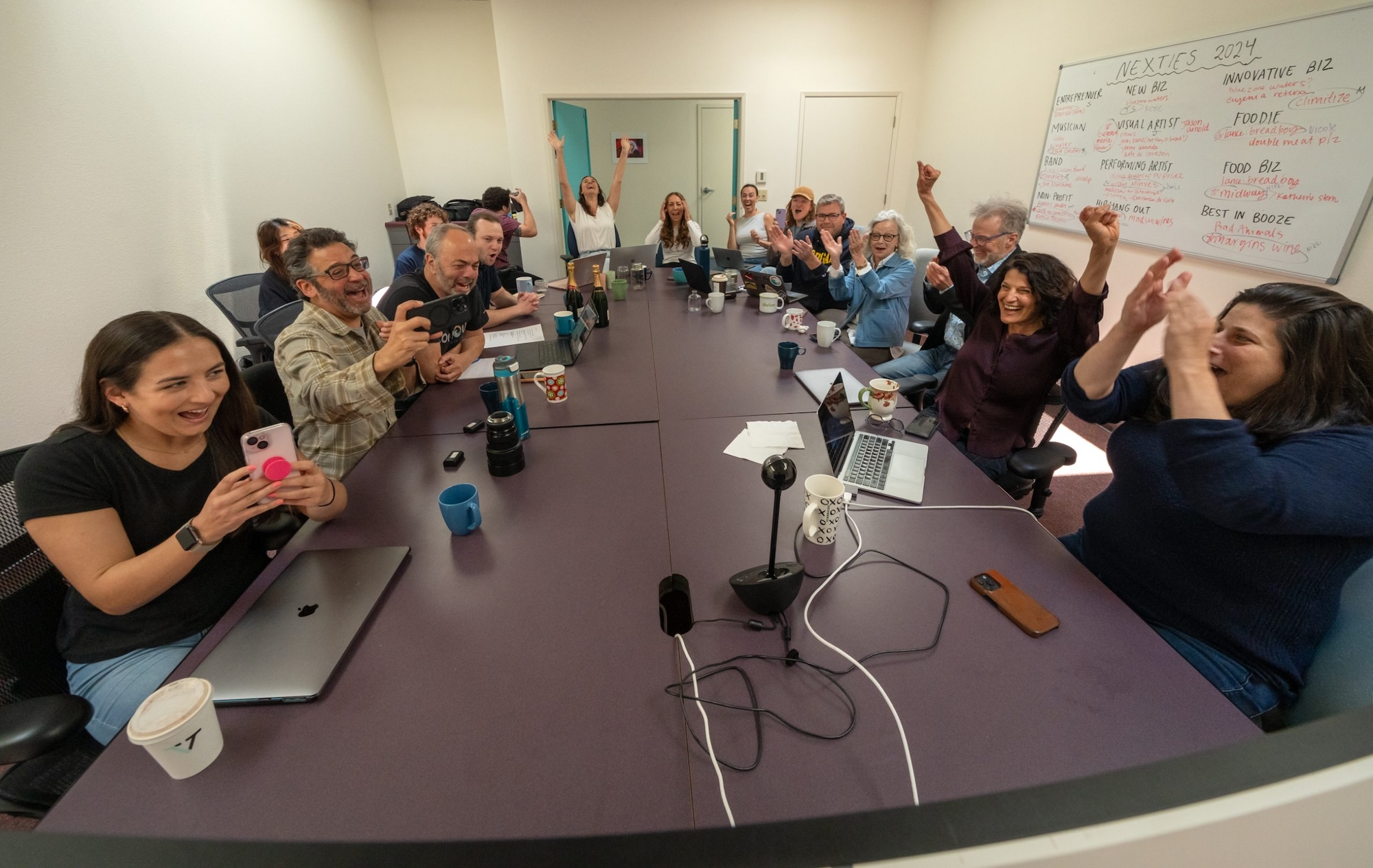
This year’s Pulitzer Prizes were a coming-out party for online media — and a marker of local newspapers’ decline
Some day in the distant future, scholars looking back on the evolution (devolution?) of the American news business will consider May 6, 2024 a date worthy of note. They’ll see it as the day the most prestigious prizes in journalism reflected the changing face of the field itself.
On Monday afternoon, the 108th edition of the Pulitzer Prizes was announced . In some ways, the winners and finalists were familiar: important investigations, incisive commentary, tremendous photography. But the list of honorees also highlighted three major ongoing shifts in American journalism:
- The best works of journalism are increasingly produced by just a few high-end institutions.
- The decline in local and regional newspapers has pushed online-native outlets to the forefront.
- The work historically performed by newspapers is increasingly done by other forms of media.
To state the obvious: Duh . None of those is a flashy new trend for 2024; they’ve each been in progress for at least two decades. But we’ve never seen a Pulitzers announcement like yesterday, when more online-native outlets (12) were honored than newspapers (8).
The Pulitzers are an annual opportunity for journalism to reflect on its best work — and who is producing it. Between my years in newspapers and here at Nieman Lab, I’ve now seen 27 Pulitzer announcement cycles — and this year’s batch of honorees is different .
The Pulitzer Prizes were, for decades, meant to honor the best in journalism as produced by American newspapers and wire services. Radio, TV, and magazines all had their own prestigious awards to battle over; the Pulitzers were for print.
But the arrival of the internet flattened out media formats and pushed a series of Pulitzer boards to broaden the prizes’ boundaries over time. In the 2009 prizes, online-only outlets were allowed to enter for the first time . In 2015, magazines were let in . 1 In 2020, the debut of a new Audio Reporting prize gave radio outlets a foot in the door. And for this year’s prizes, all TV and broadcast outlets were allowed in. 2
In the years that have followed, non-newspaper outlets have made substantial gains in certain categories — Audio Reporting, obviously, but also Feature Writing, which magazines have come to dominate. But despite online-only news orgs having been eligible for 15 years now, their wins have been more sporadic. Newspapers were still the dominant force in the main reporting categories.
Let’s look back at some Pulitzers past to see the shifts in progress. (Here and throughout this piece, I’m counting both the winners of Pulitzer Prizes and the nominated finalists, of which there are usually two per category. So some of the finalists I’ll mention were also winners, in the same way that some Oscar nominees are also Oscar winners.)
First, let’s go back twenty years, to 2004 — roughly speaking, the end of the good ol’ days for the newspaper industry, just before the Internet started to eat its lunch.
In that year , 19 newspapers produced Pulitzer finalists. Those included a wide range of dailies in metro and local markets, like Philadelphia, Providence, Seattle, Atlanta, Boston, Miami, Dallas, San Jose, Minneapolis, Baltimore — even Toledo, Ohio, and White Plains, N.Y. Outside newspapers, the only other finalists came from five wire services (AP, Reuters, Getty, Copley, and Universal Press Syndicate).
Move ahead a decade to 2014 — well into newspapers’ financial decline. Still, 24 newspapers produced Pulitzer finalists that year, including a slew of metros and smaller fry like the Colorado Springs Gazette, Seattle weekly The Stranger, and New Jersey’s Woodland Park Record. Joining newspapers were two wire services (AP and Reuters) and just one online news organization , the Center for Public Integrity. (Though CPI’s origins date back well before the web .) By this point, online outlets had been eligible for Pulitzers for five years — but finalist status was still hard to come by for those without printing presses.
How about the past couple of years?
In 2022 , finalists included 17 newspapers , three radio outfits, two magazines, two wire services, one TV network — and five online news organizations (ProPublica, Futuro Media, Insider, The Marshall Project, and Quanta).
In 2023 , finalists included 13 newspapers , three magazines, two wire services, one radio outfit — and four online news organizations (ProPublica, Politico, Mississippi Today, and Gimlet Media).
Now let’s move to yesterday’s announcement. This year’s Pulitzer finalists came from just eight newspapers , four wire services, three magazines, three TV outlets, one radio network — and a whopping 12 online news organizations .
- The newspapers : The New York Times (8 finalists), The Washington Post (6), the Los Angeles Times (2), the Chattanooga Times Free Press, the Miami Herald, the Pittsburgh Post-Gazette, The Tennessean, and The Villages Daily Sun.
- The wire services : The Associated Press (2 finalists), Bloomberg (2), Reuters (2), and Agence France Presse.
- Magazines : The New Yorker (5 finalists), The Atlantic, The New York Review of Books. TV: NBC News, Frontline, and Cox Media Group.
- Radio : New Hampshire Public Radio.
- Online outlets : ProPublica (2 finalists), Invisible Institute (2), Alabama Reflector, City Bureau, Honolulu Civil Beat, KFF Health News, Lookout Santa Cruz 3 , Mississippi Today, Stat, The Marshall Project, The Texas Tribune, and USG Audio.
That’s a big shift. Only eight newspapers producing finalists would have been unthinkable not long ago; it’s by far the lowest total since the Pulitzers began announcing the finalists (not just the winners) in 1980. And it’s not just the number of online finalists — it’s how local they are. We’re used to national powerhouses like ProPublica and The Marshall Project are competing at the highest levels. But these pieces are coming from places like Montgomery and Jackson, Honolulu and Santa Cruz.
(The finalist recognition for the Alabama Reflector , a States Newsroom site, must feel extra sweet, given that some still misguidedly label it and its siblings as so-called “pink slime” news sites .)
Look again at that list of finalists from newspapers. Collectively, they produced 21 Pulitzer finalists. But a whopping 14 of those came from either The New York Times (8) or The Washington Post (6) — leaving just 7 from all other newspapers combined . The national newspapers 4 are in an entirely different business these days from the rest of the industry. (A magazine version of the same top-heavy phenomenon can be seen in The New Yorker’s five finalists.)
There are two ways to look at this broader shift at the highest levels of award-winning journalism. An optimist would look at the unprecedented excellence from online news outlets, especially at the local level, and see signs of tremendous hope. A pessimist would see the shrinking pool of finalist-worthy newspapers and rue the continuing spiraling of the newsrooms that are, in most communities, still the single largest producers of journalism. Both would have strong arguments.
For more than a decade, news watchers have debated what a post-newspaper stage of local news might look like. What happens when the local daily goes from being the dominant provider of news to just another online news site with a print edition on the side? Some communities are closer to that reality than others — but I count Monday’s Pulitzers as yet another sign that journalism will remain feisty even after that transition.
Photo of the Lookout Santa Cruz staff learning of their Pulitzer Prize for Breaking News Reporting by Natasha Loudermilk/Lookout Santa Cruz. (Ken Doctor is sitting at the table, third from left.)
- Technically, magazines were allowed to enter only two of the journalism categories in 2015 , then five categories in 2016 , then finally all of them in 2017 . ↩︎
- Except in the photography categories. Also of note: Even before these changes, non-qualifying outlets were sometimes allowed to enter work that was done in partnership with a newspaper or other eligible outlet. ↩︎
- What a day for our old friend Ken Doctor — longtime Nieman Lab columnist and founder of Lookout Santa Cruz . I mean, he won a Pulitzer and had a Nieman Lab byline on the same day! ↩︎
- Including The Wall Street Journal, which got skunked this year. ↩︎
Cite this article Hide citations
Benton, Joshua. "This year’s Pulitzer Prizes were a coming-out party for online media — and a marker of local newspapers’ decline." Nieman Journalism Lab . Nieman Foundation for Journalism at Harvard, 7 May. 2024. Web. 18 May. 2024.
Benton, J. (2024, May. 7). This year’s Pulitzer Prizes were a coming-out party for online media — and a marker of local newspapers’ decline. Nieman Journalism Lab . Retrieved May 18, 2024, from https://www.niemanlab.org/2024/05/this-years-pulitzer-prizes-were-a-coming-out-party-for-online-media-and-a-marker-of-local-newspapers-decline/
Benton, Joshua. "This year’s Pulitzer Prizes were a coming-out party for online media — and a marker of local newspapers’ decline." Nieman Journalism Lab . Last modified May 7, 2024. Accessed May 18, 2024. https://www.niemanlab.org/2024/05/this-years-pulitzer-prizes-were-a-coming-out-party-for-online-media-and-a-marker-of-local-newspapers-decline/.
{{cite web | url = https://www.niemanlab.org/2024/05/this-years-pulitzer-prizes-were-a-coming-out-party-for-online-media-and-a-marker-of-local-newspapers-decline/ | title = This year’s Pulitzer Prizes were a coming-out party for online media — and a marker of local newspapers’ decline | last = Benton | first = Joshua | work = [[Nieman Journalism Lab]] | date = 7 May 2024 | accessdate = 18 May 2024 | ref = {{harvid|Benton|2024}} }}
To promote and elevate the standards of journalism
Covering thought leadership in journalism
Pushing to the future of journalism
Exploring the art and craft of story

The Nieman Journalism Lab is a collaborative attempt to figure out how quality journalism can survive and thrive in the Internet age.
It’s a project of the Nieman Foundation for Journalism at Harvard University .
- Subscribe to our email
- Follow us on Twitter
- Like us on Facebook
- Download our iPhone app
- Subscribe via RSS
- Tweet archive
- Search Search
Six fellows from Greece to attend Columbia Journalism’s Lede Program
They are at different stages of careers in journalism, with diverse research interests covering areas from far-right discourse and human rights to climate crisis, artificial intelligence, and the digital public sphere. Soon, they will meet as Lede Program fellows at Columbia University, at one of the world's foremost journalism schools, to develop their knowledge and skills even further. Meet the fellow below.
Dimitris Elafropoulos

Dimitris Elafropoulos, a data journalist at VIMA and media researcher, coordinates data source management, spearheads data-driven content production, and serves as the project manager for the early stages of establishing a new research unit. Holding a bachelor's degree in Language and Linguistics from Democritus University and a Master’s Degree in Information Society, Media, and Technology from Panteion University, Dimitris has also pursued graduate coursework and research in language and media at the University of Oxford, King’s College London, and the University of Toulouse. His research portfolio includes studies on Greek far-right discourse and networks in the digital public sphere, political and scientific discourse during the pandemic, and the metaphorical conceptualization of immigrants and refugees in Greek and European media. As a data journalist, he has recently delved into major crises like the collapse of electricity and water infrastructure in Gaza, as well as the deaths of journalists in the region.
Daphne Karavola
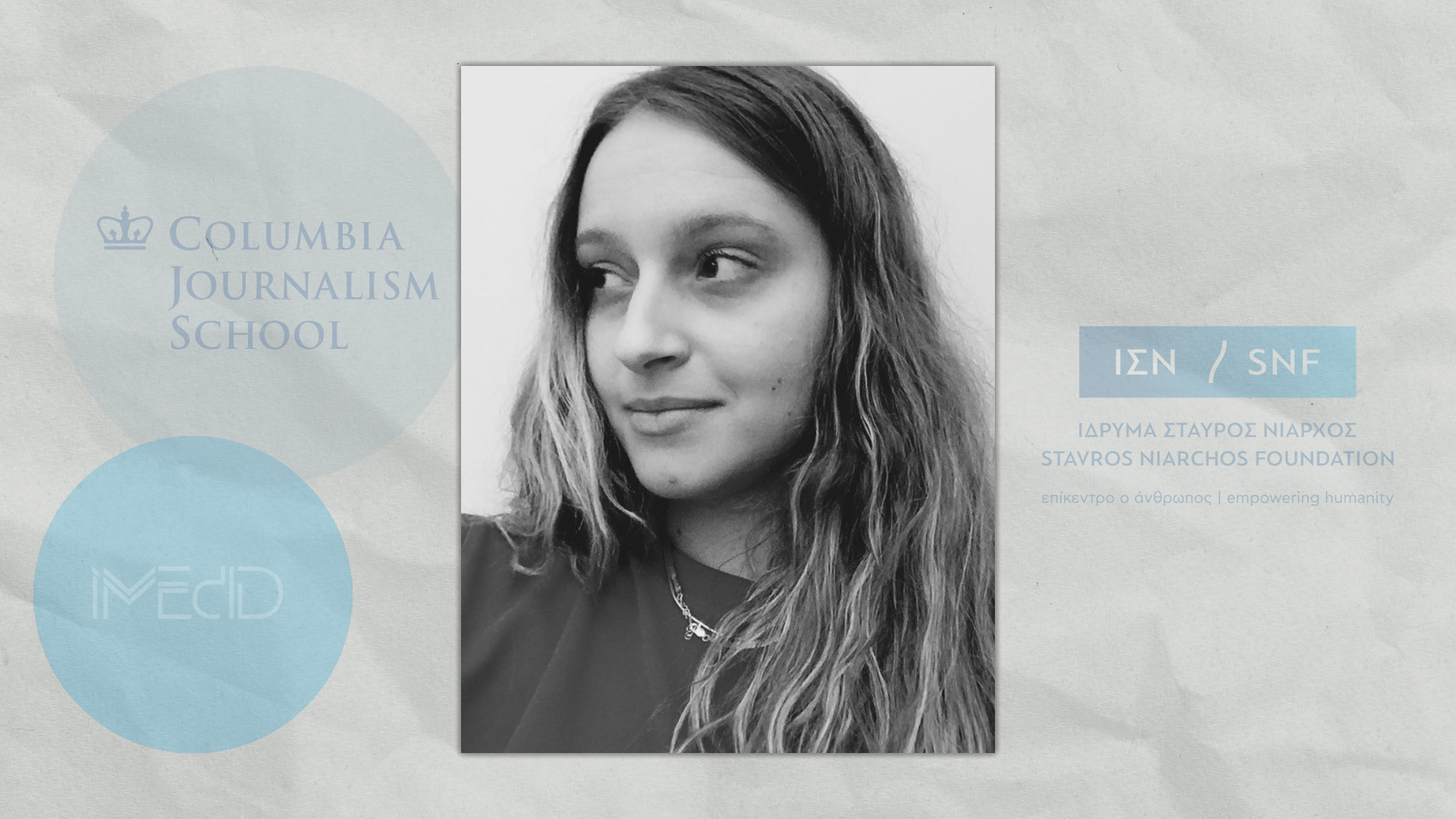
Dafni is a visual-forensic investigator with a background in architectural engineering. She graduated from the School of Architecture at the National Technical University of Athens and, upon receiving the National Architecture Scholarship from the Eugenides Foundation, pursued further studies in Research Architecture at Goldsmiths, University of London. Previously, she has collaborated with Forensic Architecture in London and Berlin. Currently, Dafni works as an investigative reporter at Reporters United in Athens. Her work is dedicated to advocating for Romani rights, with a particular focus on addressing forced displacement and infrastructural deprivation against the Romani communities of Aspropyrgos. Additionally, Dafni participates in various projects tackling state violence, environmental issues, and corporate accountability as a cartographer and visualizer.
Konstantina Maltepioti

Konstantina Maltepioti is an Athens-based investigative journalist with a specialization in OSINT reporting and has been working with Reporters United, a network of investigative journalists based in Greece, since 2021. She has participated in several cross-border investigations including Cyprus Confidential with ICIJ, MEP Misconduct with Follow the Money, and Fuelling War with Investigate Europe, a project published by 11 media and was shortlisted for the 2023 SIGMA Awards. She has also collaborated with MIIR, EUobserver, and International Press Institute. She holds an MSc in Investigative Journalism from the University of Gothenburg, Sweden, and has been a fellow at the GIJN Conference in 2021 and 2023. Her work focuses on political corruption, environment and human rights. She likes data and illustrations.
Iliana Papangeli

Iliana Papangeli is the managing director of Solomon, an independent investigative outlet based in Greece. She works as a writer, editor, and reporter, covering a wide range of topics from migration to corruption and climate change. Ιnvestigations she has worked on have received nominations (European Press Prize ‘23 & ‘21) and awards (Daphne Caruana Galizia Prize 2023, IJ4EU Impact Award 2022). As a young woman leader, she promotes the transformative power of feminist approaches and care practices within the newsrooms.
Ioanna Petsiou
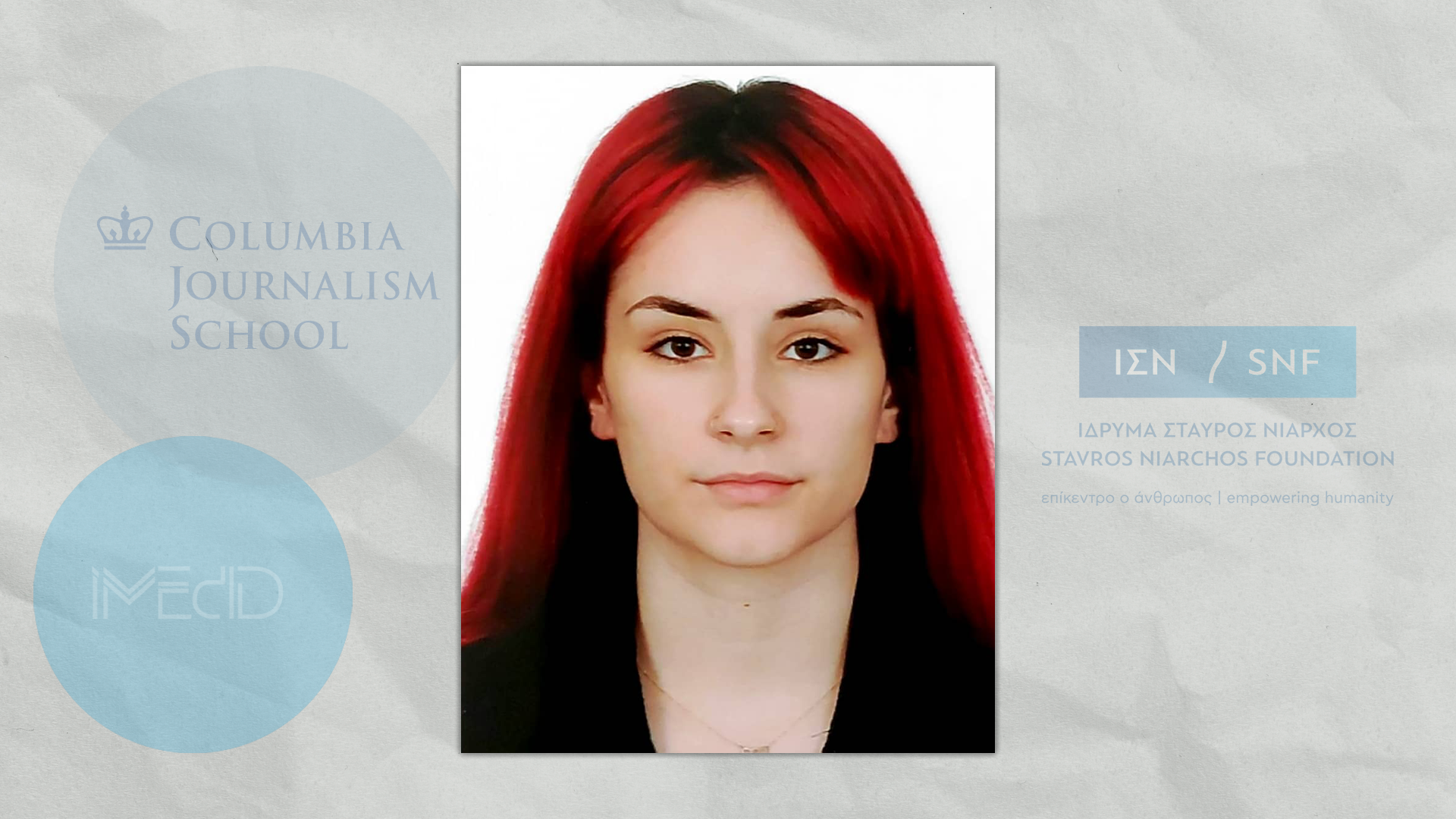
My name is Ioanna Petsiou, I am 21 years old and I study Communication, Media, and Culture in Panteion University. My interest in data journalism was sparked by a university class that revealed the fascinating stories hidden within data. I am honored and excited to have been selected to attend the Lede Program in New York, which represents a crucial step in advancing my knowledge and skills. Upon graduation, I aspire to become a professional journalist and join the data journalism community. Thanks to the amazing opportunity provided by the SNF, iMEdD & Columbia University, I will be equipped to make a significant impact in the field of data journalism.
Eftichia Soufleri

Eftichia Soufleri studied Communication and Media at the National and Kapodistrian University of Athens, with a thesis in Data Journalism. She started her professional career in 2020 at News 24/7, where she currently works as a reporter. At the same time, she is a producer of explainer videos and mini-docs at 24 MEDIA Lab. She has also published her work in Balkan Insight and Le Courrier des Balkans. She is interested in multimedia journalism and her work covers a range of topics, including migration, artificial intelligence, the climate crisis, technology, human rights and drugs.
Fellows were selected through an open application process in March and April by Columbia Journalism School. (SNF, the fellowship program’s exclusive supporter, is not involved in the evaluation of applicants.) The Lede Program is a 10-week summer program running from June 3 to August 9 that focuses on data journalism, analysis, and visualization. During and after the program, participants will receive strategic guidance from professionals at the Greece-based journalism nonprofit iMEdD . The SNF fellowships cover travel, accommodation, tuition, transportation, and food.
SNF's support for the implementation of the Data Journalism Fellowship Program at Columbia University's School of Journalism is part of the Foundation's broader effort to promote and enhance transparency, independence, and excellence in journalism, most notably through support for iMEdD. The grant for the Fellowship Program follows previous SNF support for a three-year pilot Fellowship Program from 2017 to 2019 at the School of Journalism, in which 53 journalists from Greece focused on data journalism, investigative journalism, and multimedia reporting. As part of its Ideas Zone offerings, iMEdD has previously collaborated with Columbia Journalism School on the implementation of Newsroom Essentials, a program held in Greece that covered a variety of topics, including data journalism applications and the concept of entrepreneurship in journalism.
Important note: SNF is an exclusive supporter of the Fellowship Program and is not involved in the evaluation of applicants, whose selection is the sole responsibility of the Columbia University School of Journalism.
Numbers, Facts and Trends Shaping Your World
Read our research on:
Full Topic List
Regions & Countries
- Publications
- Our Methods
- Short Reads
- Tools & Resources
Read Our Research On:
- Americans’ Changing Relationship With Local News
As news consumption habits become more digital, U.S. adults continue to see value in local outlets
Table of contents.
- 1. Attention to local news
- 2. Local news topics
- Americans’ changing local news providers
- How people feel about their local news media’s performance
- Most Americans think local journalists are in touch with their communities
- Interactions with local journalists
- 5. Americans’ views on the financial health of local news
- Acknowledgments
- The American Trends Panel survey methodology
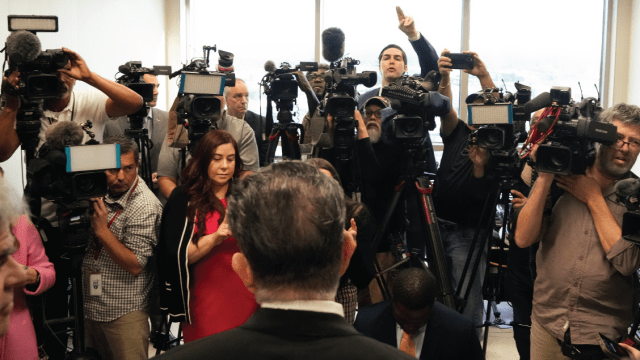
The Pew-Knight Initiative supports new research on how Americans absorb civic information, form beliefs and identities, and engage in their communities.
Pew Research Center is a nonpartisan fact tank that informs the public about the issues, attitudes and trends shaping the world. Knight Foundation is a social investor committed to supporting informed and engaged communities. Learn more >
Pew Research Center conducted this study to better understand the local news habits and attitudes of U.S. adults. It is a follow-up to a similar study conducted in 2018 .
The survey of 5,146 U.S. adults was conducted from Jan. 22 to 28, 2024. Everyone who completed the survey is a member of the Center’s American Trends Panel (ATP), an online survey panel that is recruited through national, random sampling of residential addresses. This way nearly all U.S. adults have a chance of selection. The survey is weighted to be representative of the U.S. adult population by gender, race, ethnicity, partisan affiliation, education and other categories. Read more about the ATP’s methodology .
Refer to the topline for the questions used for this survey , along with responses, and to the methodology for more details.
This is a Pew Research Center report from the Pew-Knight Initiative, a research program funded jointly by The Pew Charitable Trusts and the John S. and James L. Knight Foundation. Find related reports online at https://www.pewresearch.org/pew-knight/ .
The local news landscape in America is going through profound changes as both news consumers and producers continue to adapt to a more digital news environment. We recently asked U.S. adults about the ways they access local news, as well as their attitudes toward local journalism, finding that:
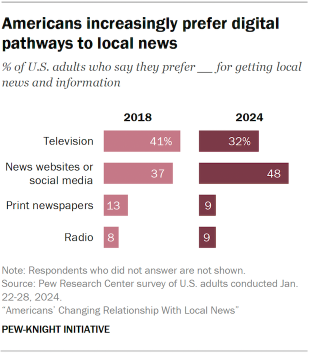
- A growing share of Americans prefer to get local news online, while fewer are getting news on TV or in print. And newspapers are no longer primarily consumed as a print product – the majority of readers of local daily newspapers now access them digitally.
- The share of U.S. adults who say they are paying close attention to local news has dropped since our last major survey of attitudes toward local news in 2018, mirroring declining attention to national news.
- Americans still see value in local news and local journalists. A large majority say local news outlets are at least somewhat important to the well-being of their local community. Most people also say local journalists are in touch with their communities and that their local news media perform well at several aspects of their jobs, such as reporting the news accurately.
- At the same time, a relatively small share of Americans (15%) say they have paid for local news in the last year. And many seem unaware of the major financial challenges facing local news: A 63% majority (albeit a smaller majority than in 2018) say they think their local news outlets are doing very or somewhat well financially.
- Majorities of both major parties say local media in their area are doing their jobs well. While Republicans and GOP-leaning independents are slightly less positive than Democrats and Democratic leaners in their opinions of local media, views of local news don’t have the same stark political divides that exist within Americans’ opinions about national media .
- Most Americans say local journalists should remain neutral on issues in their community, but a substantial minority say local journalists should take a more active role. About three-in-ten say local journalists should advocate for change in their communities, a view that’s especially common among Democrats and younger adults.
These are some of the key findings from a new Pew Research Center survey of about 5,000 U.S. adults conducted in January 2024. This is the first in a series of Pew Research Center reports on local news from the Pew-Knight Initiative, a research program funded jointly by The Pew Charitable Trusts and the John S. and James L. Knight Foundation.
Americans largely hold positive views of local news organizations
At a time when many local news outlets are struggling and Americans’ trust in the news media has waned, the vast majority of U.S. adults (85%) say local news outlets are at least somewhat important to the well-being of their local community. This includes 44% who say local journalism is extremely or very important to their community
About seven-in-ten U.S. adults (69%) say that local journalists in their area are mostly in touch with their community, up from 63% who said this in 2018. And most Americans also say their local news organizations are doing well at four key roles:
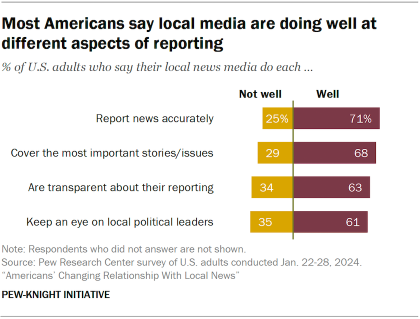
- Reporting news accurately (71%)
- Covering the most important stories (68%)
- Being transparent (63%)
- Keeping an eye on local political leaders (61%).
These are relatively positive views compared with how Americans see news organizations more broadly. For instance, a 2022 Pew Research Center survey found that fewer than half of U.S. adults say that news organizations in general do a very or somewhat good job of covering the most important stories, reporting the news accurately and serving as a watchdog over elected leaders.
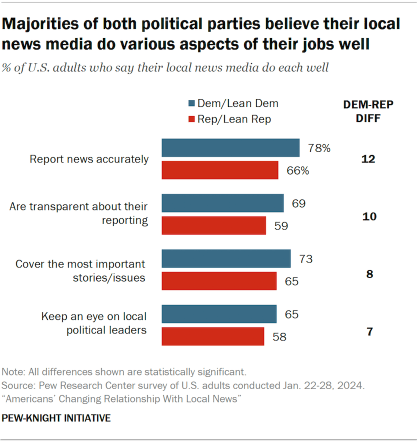
What’s more, views toward local news are not as politically polarized as Americans’ opinions about the news media overall. While Republicans and GOP-leaning independents are not quite as positive as Democrats and Democratic leaners in some of their assessments of local journalists, most Republicans still say the local media in their area are doing their jobs well.
For example, roughly three-quarters of Democrats (78%) say their local media do well at reporting news accurately, compared with about two-thirds of Republicans (66%).
By comparison, the 2022 survey found that 51% of Democrats and just 17% of Republicans say that news organizations in general do a very or somewhat good job of reporting the news accurately.
Jump to more information on views toward local news organizations.
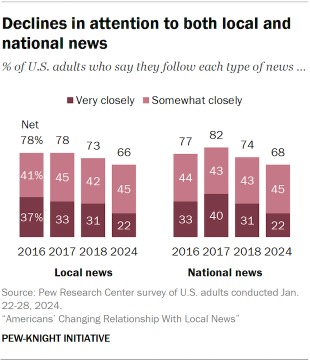
Fewer Americans are closely following local news – and other types of news
Despite these positive views toward local news organizations, there are signs that Americans are engaging less with local journalism than they used to.
The share of Americans who say they follow local news very closely has fallen by 15 percentage points since 2016 (from 37% to 22%). Most U.S. adults still say they follow local news at least somewhat closely (66%), but this figure also has dropped in recent years.
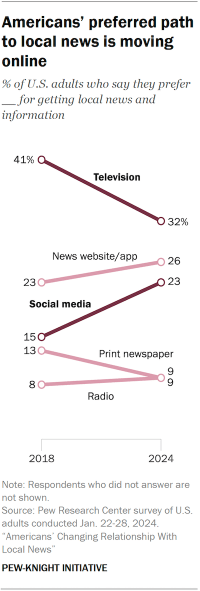
This trend is not unique to local news – Americans’ attention to national and international news also has declined.
The local news landscape is becoming more digital
The ways in which Americans access local news are changing, reflecting an increasingly digital landscape – and matching patterns in overall news consumption habits .
Preferred pathways to local news
- Fewer people now say they prefer to get local news through a television set (32%, down from 41% who said the same in 2018).
- Americans are now more likely to say they prefer to get local news online, either through news websites (26%) or social media (23%). Both of these numbers have increased in recent years.
- Smaller shares prefer getting their local news from a print newspaper or on the radio (9% each).
Specific sources for local news
The types of sources (e.g., outlets or organizations) Americans are turning to are changing as well:
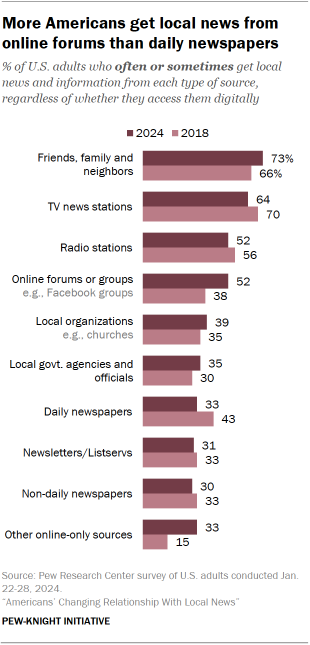
- While local television stations are still the most common source of local news beyond friends, family and neighbors, the share who often or sometimes get news there has declined from 70% to 64% in recent years.
- Online forums, such as Facebook groups or the Nextdoor app, have become a more common destination for local news: 52% of U.S. adults say they at least sometimes get local news from these types of forums, up 14 percentage points from 2018. This is on par with the percentage who get local news at least sometimes from local radio stations.
- Meanwhile, a third of Americans say they at least sometimes get local news from a daily newspaper, regardless of whether it is accessed via print, online or through a social media website – down 10 points from 2018. The share of Americans who get local news from newspapers is now roughly on par with the share who get local news from local government agencies (35%) or local newsletters or Listservs (31%).
Not only are fewer Americans getting local news from newspapers, but local daily newspapers are now more likely to be accessed online than in print.
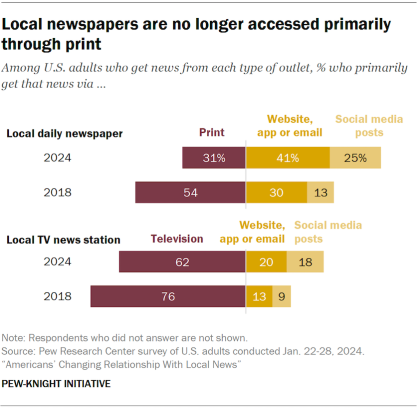
- 31% of those who get news from daily newspapers do so via print, while far more (66%) do so digitally, whether through websites, apps, emails or social media posts that include content from the paper.
- In 2018, just over half of those who got news from local daily newspapers (54%) did so from print, and 43% did so via a website, app, email or social media site.
There is a similar move toward digital access for local TV stations, though local TV news is still mostly consumed through a TV set.
- In 2024, 62% of those getting news from local TV stations do so through a television, compared with 37% who do so through one of the digital pathways.
- An even bigger majority of local TV news consumers (76%) got that news through a TV set in 2018.
Jump to more information on how people access local news.
The financial state of local news
The turmoil for the local news industry in recent years has come with major financial challenges. Circulation and advertising revenue for newspapers have seen sharp declines in the last decade, according to our analysis of industry data , and other researchers have documented that thousands of newspapers have stopped publishing in the last two decades. There also is evidence of audience decline for local TV news stations, although advertising revenue on local TV has been more stable.
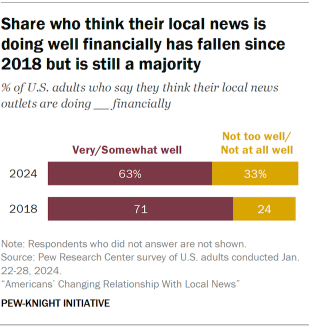
When asked about the financial state of the news outlets in their community, a majority of Americans (63%) say they think their local news outlets are doing very or somewhat well, with a third saying that they’re not doing too well or not doing well at all. This is a slightly more pessimistic view than in 2018, when 71% said their local outlets were doing well, though it is still a relatively positive assessment of the financial state of the industry.
Just 15% of Americans say they have paid or given money to any local news source in the past year – a number that has not changed much since 2018. The survey also asked Americans who did not pay for news in the past year the main reason why not. The most common explanation is that people don’t pay because they can find plenty of free local news, although young adults are more inclined to say they just aren’t interested enough in local news to pay for it.
Jump to more information on how people view the financial state of local news.
Other key findings in this report
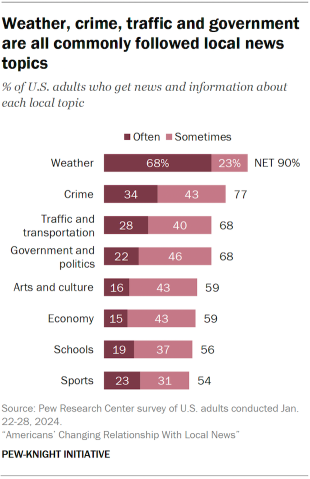
Americans get local news about a wide variety of topics. Two-thirds or more of U.S. adults at least sometimes get news about local weather, crime, government and politics, and traffic and transportation, while smaller shares (but still at least half) say they get local news about arts and culture, the economy, schools, and sports.
Relatively few Americans are highly satisfied with the coverage they see of many topics. The survey also asked respondents who at least sometimes get each type of local news how satisfied they are with the news they get. With the exception of weather, fewer than half say they are extremely or very satisfied with the quality of the news they get about each topic. For example, about a quarter of those who consume news about their local economy (26%) say they are extremely or very satisfied with this news. Read more about different local news topics in Chapter 2.
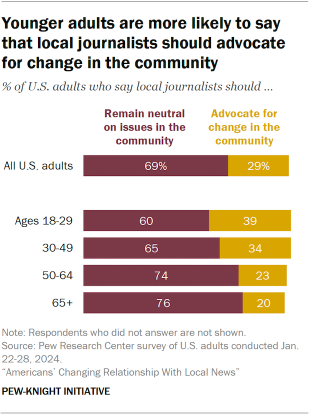
When asked whether local journalists should remain neutral on community issues or advocate for change in the community, a majority of Americans (69%) say journalists should remain neutral, reflecting more traditional journalistic norms. However, 29% say that local journalists should be advocating for change in their communities. Younger adults are the most likely to favor advocacy by journalists: 39% of those ages 18 to 29 say that local journalists should push for change, as do 34% of those 30 to 49. Read more about Americans’ views of the role of local journalists in Chapter 4.
Americans who feel a strong sense of connection to their community are more likely to engage with local news, say that local news outlets are important to the community, and rate local media more highly overall. For example, 66% of those who say they are very attached to their community say local news outlets are extremely or very important to the well-being of their local community, compared with 46% of those who are somewhat attached and 31% of those who are not very or not at all attached to their community.
Sign up for our weekly newsletter
Fresh data delivery Saturday mornings
Sign up for The Briefing
Weekly updates on the world of news & information
- Digital News Landscape
- Journalists
- Trust in Media
Introducing the Pew-Knight Initiative
8 facts about black americans and the news, audiences are declining for traditional news media in the u.s. – with some exceptions, how black americans engage with local news, local tv news fact sheet, most popular, report materials.
1615 L St. NW, Suite 800 Washington, DC 20036 USA (+1) 202-419-4300 | Main (+1) 202-857-8562 | Fax (+1) 202-419-4372 | Media Inquiries
Research Topics
- Age & Generations
- Coronavirus (COVID-19)
- Economy & Work
- Family & Relationships
- Gender & LGBTQ
- Immigration & Migration
- International Affairs
- Internet & Technology
- Methodological Research
- News Habits & Media
- Non-U.S. Governments
- Other Topics
- Politics & Policy
- Race & Ethnicity
- Email Newsletters
ABOUT PEW RESEARCH CENTER Pew Research Center is a nonpartisan fact tank that informs the public about the issues, attitudes and trends shaping the world. It conducts public opinion polling, demographic research, media content analysis and other empirical social science research. Pew Research Center does not take policy positions. It is a subsidiary of The Pew Charitable Trusts .
Copyright 2024 Pew Research Center
- Election 2024
- Entertainment
- Newsletters
- Photography
- Personal Finance
- AP Investigations
- AP Buyline Personal Finance
- AP Buyline Shopping
- Press Releases
- Israel-Hamas War
- Russia-Ukraine War
- Global elections
- Asia Pacific
- Latin America
- Middle East
- Election Results
- Delegate Tracker
- AP & Elections
- Auto Racing
- 2024 Paris Olympic Games
- Movie reviews
- Book reviews
- Personal finance
- Financial Markets
- Business Highlights
- Financial wellness
- Artificial Intelligence
- Social Media
Pulitzer Prizes in journalism awarded to The New York Times, The Washington Post, AP and others

- Copy Link copied
NEW YORK (AP) — The New York Times and The Washington Post were awarded three Pulitzer Prizes apiece on Monday for work in 2023 that dealt with everything from the war in Gaza to gun violence, and The Associated Press won in the feature photography category for coverage of global migration to the U.S.
Hamas’ Oct. 7 attack on Israel and its aftermath produced work that resulted in two Pulitzers and a special citation. The Times won for text coverage that the Pulitzer board described as “wide-ranging and revelatory,” while the Reuters news service won for its photography. The citation went to journalists and other writers covering the war in Gaza.
The prestigious public service award went to ProPublica for reporting that “pierced the thick wall of secrecy” around the U.S. Supreme Court to show how billionaires gave expensive gifts to justices and paid for luxury travel. Reporters Joshua Kaplan, Justin Elliott, Brett Murphy, Alex Mierjeski and Kirsten Berg were honored for their work.
The Pulitzers honored the best in journalism from 2023 in 15 categories, as well as eight arts categories focused on books, music and theater. The public service winner receives a gold medal. All other winners receive $15,000.
Migrants reach through a border wall for clothing handed out by volunteers as they wait between two border walls to apply for asylum Friday, May 12, 2023, in San Diego. Hundreds of migrants remain waiting between the two walls, many for days. (AP Photo/Gregory Bull)
The 15 photos in AP’s winning entry were taken across Latin America and along the U.S.-Mexico border in Texas and California in a year when immigration was one of the world’s biggest stories. They were shot by AP staffers Greg Bull, Eric Gay, Fernando Llano, Marco Ugarte and Eduardo Verdugo, and longtime AP freelancers Christian Chavez, Felix Marquez and Ivan Valencia.
“These raw and emotional images came about through day-to-day coverage of a historic moment in multiple countries documenting migrants at every step of their treacherous journeys,” said Julie Pace, the AP’s senior vice president and executive editor.
FEATURE PHOTOGRAPHY: The Associated Press won the Pulitzer Prize for feature photography for its coverage of immigration from Latin America to the U.S.
FINALIST: The AP was named a finalist for the national reporting Pulitzer for its coverage of the hundreds of thousands of kids who disappeared from public schools during the pandemic.
WINS THROUGH THE YEARS: The AP has now won 59 Pulitzer prizes, including 36 for photography. See all of AP’s Pulitzer-winning journalism here.
The United States has seen more than 10 million border arrivals in the last five years, with migrants arriving from a wide range of new locations like Venezuela, Cuba, Ecuador, Haiti and African countries, in contrast with earlier eras.
The AP has won 59 Pulitzer Prizes, including 36 for photography. The news cooperative was named a finalist for the national reporting Pulitzer on Monday for its coverage of hundreds of thousands of children who disappeared from public schools during the pandemic .
In citing the Times for its work in Israel and Gaza, the Pulitzer board mentioned its coverage of the country’s intelligence failures, along with the attack and Israel’s military response.
The award comes even as The Times has faced some controversy about its coverage; last month a group of journalism professors called on the publication to address questions about an investigation into gender-based violence during the Hamas attack on Israel.
The Times’ Hannah Dreier won a Pulitzer in investigative reporting for her stories on migrant child labor across the United States. Contributing writer Katie Engelhart won the newspaper’s third Pulitzer, in feature writing, for her portrait of a family struggling with a matriarch’s dementia.
“Every one of the winners and finalists showcases a drive for original, revelatory reporting that underpins so much of what we produce, from the biggest storylines in the news to feature writing as well as classic investigations,” said Joe Kahn, the Times’ executive editor.
The Washington Post staff won in national reporting for its “sobering examination” of the AR-15 semi-automatic rifle, which came with some gut-wrenching photos. “We were eager to find a way to cover it differently and change the conversation about mass shootings,” Peter Walstein, the Post’s senior national enterprise editor, said in the newspaper.
The Post’s David E. Hoffman won in editorial writing for a “compelling and well-researched” series on how authoritarian regimes repress dissent in the digital age. Its third award went to contributor Vladimir Kara-Murza , for commentaries written from a Russian prison cell.
The New Yorker magazine won two Pulitzers. Sarah Stillman won in explanatory reporting for her report on the legal system’s reliance on felony murder charges. Contributor Medar de la Cruz won in illustrated reporting and commentary for his story humanizing inmates in the Rikers Island jail in New York City.
The staff of Lookout Santa Cruz in California won in the breaking news category for what the prize board called “nimble community-minded coverage” of flooding and mudslides. On its website Monday, Lookout Santa Cruz said that it made its coverage free at a time of crisis in the community, and also used text messages to reach people without power.
“In short, we did our jobs,” the staff said in an unsigned article, “and we heard so many thanks for it. The Pulitzer is icing on that cake.”
The Pulitzers gave a second award in national reporting to the Reuters staff for an “eye-opening” series that probed Elon Musk’s automobile and aerospace businesses.
In local reporting, Sarah Conway of City Bureau and Trina Reynolds-Tyler of the Invisible Institute won for an investigative series on missing Black girls and women in Chicago, which showed how racism and the police contributed to the problem.
The Pulitzer in criticism went to Justin Chang of The Los Angeles Times for evocative and genre-spanning coverage of movies. The Pulitzer board’s second special citation went to the late hip-hop critic Greg Tate.
The awards are administered by Columbia University in New York, which itself has been in the news for student demonstrations against the war in Gaza. The Pulitzer board met away from Columbia this past weekend to deliberate on its winners.
The Pulitzers announced that five of the 45 finalists this year used artificial intelligence in research and reporting of their submissions. It was the first time the board required applicants for the award to disclose use of AI.
The prizes were established in the will of newspaper publisher Joseph Pulitzer and first awarded in 1917.
David Bauder writes about media for The Associated Press. Follow him at http://twitter.com/dbauder .


How Biden and Trump kneecapped the media with their debate deal
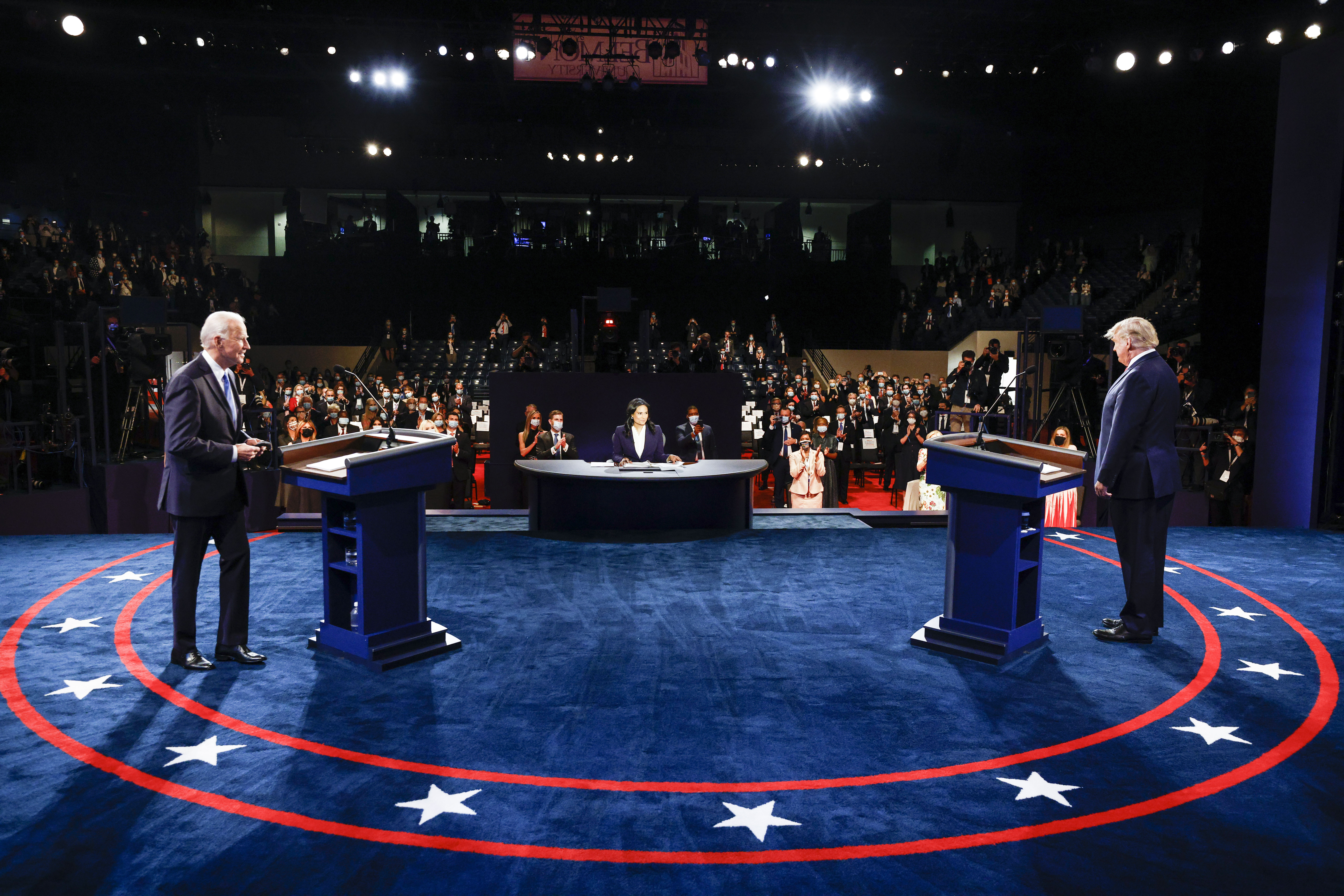
Joe Biden and Donald Trump may have just taunted each other into a pair of presidential debates—but in doing so, they further undercut the power of news organizations to make sure the debates are run in a way that best serves the voters, rather than the candidates.
Biden kicked off a flurry of activity Wednesday morning with a video message to Trump challenging him to debate, while tweaking him for being stuck in court for his criminal trial much of the week.
“Make my day, pal,” Biden said, doing his best Clint Eastwood impression. “Let’s pick the dates, Donald. I hear you’re free on Wednesdays.”
Trump quickly responded with a similarly dated pop-culture reference, posting: “Just tell me when, I’ll be there. ‘Let’s get ready to Rumble!!!’”
This led to a frenzy from the TV networks, which scrambled to put together bids to bring the two candidates in.
Biden and Trump quickly accepted a June 27 CNN debate proposal. They also agreed to a September 10 debate on ABC.
Biden’s team has agreed to a vice presidential debate with CBS. Trump and his team haven’t committed to that one yet, but are pushing for more for the top of the ticket. Trump announced he had accepted an October debate offer from the conservative Fox News and challenged Biden to join him. His campaign asked for additional dates as well.
“We propose a debate in June, a debate in July, a debate in August, and a debate in September, in addition to the Vice Presidential debate,” Chris LaCivita and Susie Wiles, the Trump campaign’s co–campaign managers, said in a memo. “Additional dates will allow voters to have maximum exposure to the records and future visions of each candidate.”
At least Trump and Biden now look like they’ll debate, which had appeared less than likely the past few months. But it’s still not a sure thing.
Trump has a long history of messing with the debates. He completely spurned debating his rivals during the 2024 primary, forced the cancellation of one of his scheduled debates with Biden in 2020 when he refused to appear remotely while he had COVID, and declined to appear at the final 2016 GOP primary debate before voters headed to the polls.
Biden isn’t a lock, either. His team says that he’ll only debate if it’s just against Trump—suggesting he’d back out if Robert F. Kennedy Jr. were included.
“President Biden made his terms clear for two one-on-one debates, and Donald Trump accepted those terms. No more games. No more chaos, no more debate about debates,” Biden campaign manager Jen O’Malley Dillon said in a Wednesday statement. “We’ll see Donald Trump on June 27th in Atlanta—if he shows up.”
CNN’s proposed debate parameters say that a candidate will be included if they receive at least 15 percent in four separate high-quality national polls and are qualified to appear on enough state ballots to theoretically win 270 Electoral College votes.
Say what you will about RFK Jr., but he’s winning about 10 percent of the vote in national polling averages and his campaign says they’re gathering enough signatures to get him on the ballot in most states.
Kennedy accused Biden and Trump of “colluding” to keep him off the debate stage—and he’s right.
If Kennedy does qualify, what happens then? Does Biden pull out? Might another network agree to his demands in order to steal CNN’s reflected prestige and ratings? If that happens, will Trump agree?
If all this sounds messy, it’s just one of the major consequences of arranging the debates in an ad hoc manner, while circumventing the Commission on Presidential Debates.
The CPD has governed debates for the past nine presidential cycles. That doesn’t exactly make it some hallowed, centuries-old pillar of democracy, but it has established two important dynamics: It forced the news networks to work together rather than compete with each other for debates, making it easier for them to resist presidential candidates’ demands about specific debate rules, like how long they’d run and whether moderators could cut off candidates’ microphones if they talked past their allotted time. It also guaranteed a lot more eyeballs, since the debates were carried by every network rather than being given exclusively to one.
CNN’s debate will be held far earlier than in previous years (and before either candidate will officially be his party’s nominee). That also makes it long before most voters are tuning in to the election enough to engage with a debate—and long enough that whatever happens won’t be fresh in voters’ minds come the fall election.
CNN claims that it’s available in eighty million US households, but even if we take the network at its word on that figure, that means fifty-seven million American homes won’t be able to watch the debate on TV. (The network says it plans to stream it online.)
As the Commission on Presidential Debates put it to the Associated Press on Thursday, it was created “specifically to ensure that such debates reliably take place and reach the widest television, radio and streaming audience.”
Without the commission controlling things, and the various news organizations respecting and backing its process, candidates can dictate which networks they debate on, when those debates happen, and how they are run. That’s great for the two major-party nominees and the networks that get exclusives on the debates—but not good for just about everyone else.
Other notable stories:
- Earlier this week, CJR’s Jon Allsop reported that The New Yorker had restricted UK readers’ online access to a story about Lucy Letby, a British neonatal nurse convicted of murdering seven babies, to comply with a court order limiting coverage of the ongoing case, but that the print edition would still be available in the country. The Times of London now reports that British legal authorities have discussed the article . Press Gazette ’s Bron Maher spoke with lawyers about possible ramifications for The New Yorker ; one pointed out that British law makes no distinction between digital and print publication, though another said that courts cannot enforce contempt orders against companies that are not incorporated in England. ( The New Yorker no longer has a corporate entity in the UK, per Maher, though Condé Nast, its parent company, does.)
- On Wednesday, Edith Chapin, NPR’s editor in chief, outlined plans to “enhance and strengthen editorial operations” at the broadcaster , including by adding a new level of editorial review, known as “the Backstop,” to be managed by a new group of senior editors. According to Benjamin Mullin, of the New York Times , the announcement angered many NPR staffers , with some seeing it as “an unnecessary bottleneck” and others suggesting that it looked like a defensive response to recent criticism from Uri Berliner, a former editor who publicly accused NPR of inflexible left-wing thinking. (Chapin denied this.) Per Mullin, Michel Martin, a top NPR host, asked Chapin to identify who is funding the new initiative during an internal meeting; Chapin wouldn’t say.
- In media-jobs news, the Marshall Project , a nonprofit newsroom that covers criminal justice, announced that Susan Chira , its editor in chief, will step down early next year. Elsewhere, Justin Wells —who produced Tucker Carlson’s show on Fox News, then took over as president of Carlson’s independent media company after Fox ousted the pair last year —is leaving that role to launch his own company, though he will reportedly continue to advise Carlson. And—after the New York radio station WABC canceled a show hosted by Rudy Giuliani over his penchant for election lies— Mediaite reports that the right-wing network Newsmax could also ax Giuliani, though Newsmax strongly denied this to CNN .
- For Drilled and The Nation , Molly Taft went through a cache of internal oil and gas industry documents that were subpoenaed by Congress, and reported on what they reveal about the industry’s attempts to manipulate the press . The documents “provide lessons for journalists dealing with oil companies—to know that they’re keeping notes on you, your outlet, your potential opinions on climate action, and whether or not you can come around to their narrative,” Taft writes. “Journalists now know that Big Oil has a playbook, and it’s our responsibility to study it and factor that into our coverage.”
- And Nieman Lab’s Hanaa’ Tameez spoke with The Intercept about how “increasingly stress-inducing subject lines” in a recent email fundraising campaign (sample: “We’re not exaggerating. If people don’t pay for it, journalism will die”) helped the site to add more new recurring donors than it had targeted . “A shorter, two-week campaign with direct language is less likely to spam subscribers and turn off potential donors, in the organization’s view,” Tameez writes. “Donating also comes with a perk: no more emails.”
The voice of journalism, since 1961
- Privacy Policy
Support CJR
- Become a Member

IMAGES
VIDEO
COMMENTS
Conservative Media's Coverage of Coronavirus on YouTube: A Qualitative Analysis of Media Effects on Consumers, Michael J. Layer. Theses/Dissertations from 2019 PDF. Problem Chain Recognition Effect and CSR Communication: Examining the Impact of Issue Salience and Proximity on Environmental Communication Behaviors, Nandini Bhalla. PDF
This collection contains theses and dissertations from the Department of Media Studies, collected from the Scholarship@Western Electronic Thesis and Dissertation Repository. Follow. Theses/Dissertations from 2023 PDF. Witnessing ... Covering Suicide: The Changing Ethical Norms in Canadian Journalism, Gemma Richardson. PDF. Labours Of ...
Profession and Identity of TV Journalism, the Quality of News, and theAudience Engagement" (2019). USF Tampa Graduate Theses and Dissertations. https://digitalcommons.usf.edu/etd/7723 This Thesis is brought to you for free and open access by the USF Graduate Theses and Dissertations at Digital Commons @ University of South Florida.
Theses/Dissertations from 2019 PDF. The Role of Social Media Journalists in TV News:Their Effects on the Profession and Identity of TV Journalism, the Quality of News, and theAudience Engagement, Yousuf Humiad AL Yousufi. PDF. Relationship Management Communications by NHL Teams on Twitter, Kelsey M. Baker. PDF
Representation and Exploitation of War and Conflict: Publicly Appropriable Media as Low Hanging Fruit. McLaughlin, Andrew (University of Oregon, 2024-01-09) This dissertation examines the phenomenon of War Porn, a term that describes the visual destruction of bodies in conflict to elicit a visceral reaction in viewers for the purposes of ...
This dissertation examines the United States's elite news media's hegemony in a global media landscape, and how it can come to stand for the entire American nation in the imagination of outsiders. In this transnational, instantaneous digital media arena, what is created for an American audience can fairly easily be accessed, interpreted and ...
Theses that are available online can be accessed by following the links below. To browse online theses by discipline, go into the Research Repository / Arts Theses and Dissertations / scroll down left column to Thesis Discipline / and navigate to Journalism / Media and Communication or Mass Communication. See also: Thesis guide.
dissertation specifically addressed the following objectives in the context of citizen journalism: (1) examine major news frames, narratives, argumentative tones; (2) explore ... mentioned in relation to the media industry, professional journalism, and journalism ethics more often than natural disasters and social events. Also, citizen news ...
In her dissertation, she analyzed the growing importance of audience metrics in web journalism in the United States and France. Drawing on ethnographic methods, she examined how American and French journalists make sense of traffic numbers in different ways, which in turn has distinct effects on the production of news in the two countries ...
His dissertation "Humanity's Publics: NGOs, Journalism and the International Public Sphere" examined reporting roles assumed by international NGOs as legacy media outlets cut their foreign news budgets, and received the Gene Burd Outstanding Dissertation in Journalism Studies award from the International Communication Association.
These MSc dissertations have been selected by the editor and deputy editor of the Media@LSE Working Paper Series and consequently, are not the responsibility of the Working Paper Series Editorial Board. 2022-23. No 313 The App Keeps the Score: Period-Tracking Apps, Self-Empowerment and the Self as Enterprise, Martina Sardelli.
Whereas the field of journalism studies draws on a rich history of multidisciplinary theorizing, epistemologies of journalism have received increased attention in recent years. There is a close link between news production and epistemology because the production of news inherently involves developing news information into one form of knowledge.
Journalism Dissertation Topics - Get a Research Based Topic. Published by Owen Ingram at January 2nd, 2023 , Revised On August 11, 2023. Coming up with original journalism dissertation topics for your undergraduate, Master or PhD degree can be a very frustrating experience. In contrast to other disciplines, journalism dissertations are judged ...
Summary. Professional roles are a key topic in journalism research along with the fundamental elements in defining journalism as a profession. For many decades, scholars have devoted their efforts to analyzing normative standards and journalistic ideals, while their analysis through the lens of professional performance has remained in the background.
Video (online) Consult the top 50 dissertations / theses for your research on the topic 'Mass Media and Journalism.'. Next to every source in the list of references, there is an 'Add to bibliography' button. Press on it, and we will generate automatically the bibliographic reference to the chosen work in the citation style you need: APA, MLA ...
The leading question of this thesis is: What is the role for the institution of journalism in the digital media landscape? Central to this issue is the next question: how to normatively deal with truth and objectivity in the media? In order to determine this role, a contemplation on the moral duties of digital media platforms will be conducted.
communication actually makes each individual a media outlet in him or herself, and that such methods have led to the diminishing of journalism as a profession (Poell and Borra 2011). Like news, social media has become an integral modern method of communicating with one another (Kaplan and Haenlein 2012).
If you're just starting out exploring journalism-related topics for your dissertation, thesis or research project, you've come to the right place. In this post, we'll help kickstart your research by providing a hearty list of journalism-related research ideas, including examples from recent studies.. PS - This is just the start…
At the larger subject university, where the relevant major was Multimedia. Journalism, 22 out of 77 majors participated in the study for a participation rate of 28.6%. 206 majors participated in ...
The second generation of web tools shook the journalist profession approximately two decades ago with the proactive incorporation of audiences into the media. Citizen journalism and user-generated content arose as an object of interest due to the democratising value of participation attributed to them, with empowered citizens who could emulate the professional and institutional practises of ...
Digital Journalism Latest Articles. Submit an article Journal homepage. 0 Views 0 CrossRef citations to date 0. Altmetric ... we shifted our focus to the different journalist-audience relationships different media outlets establish. In an explorative interview study with 32 German journalists, we analyzed how experiences of harassment are ...
In this article, we focus on news specifically and present a pre-registered analysis of survey data from 2015 to 2022 in a total of 46 countries (N = 577,859).While other studies suggest that digital media has enabled greater and broader participation with news above and beyond those who engage offline, we show that, in recent years, participation with news has declined by 12% -such that in ...
The Pulitzer Prizes were, for decades, meant to honor the best in journalism as produced by American newspapers and wire services. Radio, TV, and magazines all had their own prestigious awards to battle over; the Pulitzers were for print. But the arrival of the internet flattened out media formats and pushed a series of Pulitzer boards to broaden the prizes' boundaries over time.
Eftichia Soufleri studied Communication and Media at the National and Kapodistrian University of Athens, with a thesis in Data Journalism. She started her professional career in 2020 at News 24/7, where she currently works as a reporter. At the same time, she is a producer of explainer videos and mini-docs at 24 MEDIA Lab.
Wounded and limping, doubting its own future, American journalism seems to be losing a quality that carried it through a century and a half of trials: its swagger. Swagger is the conformity ...
At a time when many local news outlets are struggling and Americans' trust in the news media has waned, the vast majority of U.S. adults (85%) say local news outlets are at least somewhat important to the well-being of their local community. This includes 44% who say local journalism is extremely or very important to their community
NEW YORK (AP) — The New York Times and The Washington Post were awarded three Pulitzer Prizes apiece on Monday for work in 2023 that dealt with everything from the war in Gaza to gun violence, and The Associated Press won in the feature photography category for coverage of global migration to the U.S.. Hamas' Oct. 7 attack on Israel and its aftermath produced work that resulted in two ...
The Newmark Graduate School of Journalism is excited to announce that Darryl Holliday will join us in Fall 2024 as an Entrepreneur-in-Residence. Holliday is a seasoned journalist, coalition builder and civic strategist who has spent over a decade building a blueprint for journalism at the intersection of community organizing, participatory ...
In media-jobs news, the Marshall Project, a nonprofit newsroom that covers criminal justice ... Award for distinguished reporting of Congress and the 2020 National Press Club award for excellence in political journalism, he previously worked for VICE News, Talking Points Memo, the New York Daily News, The Hill and National Journal. The voice of ...
The 1st of August 2018 marks twenty years since a group of ethnic Circassians from Kosovo, fleeing the war there, arrived in Adygea. The families moved to the specially-built village of Mafekhabl in the suburbs of Maykop. There are currently over 50 families living in the village, working in state institutions, the police, education, and medicine.